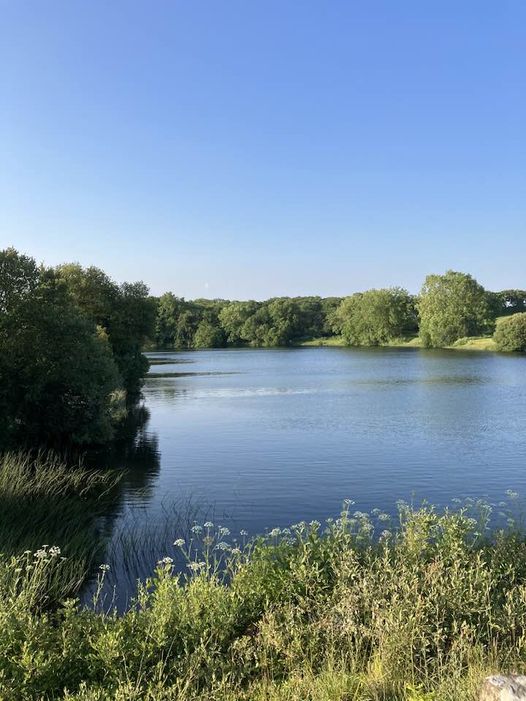
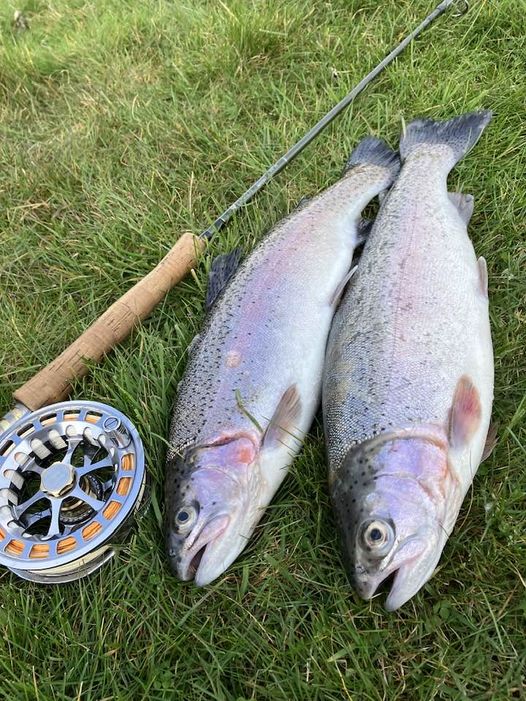
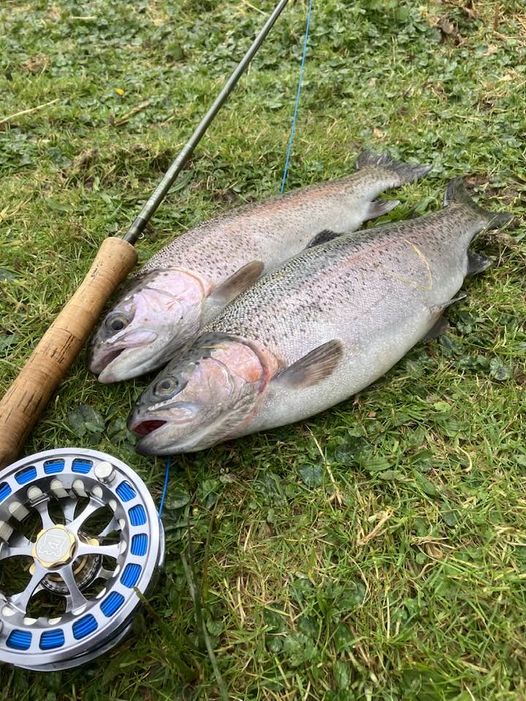



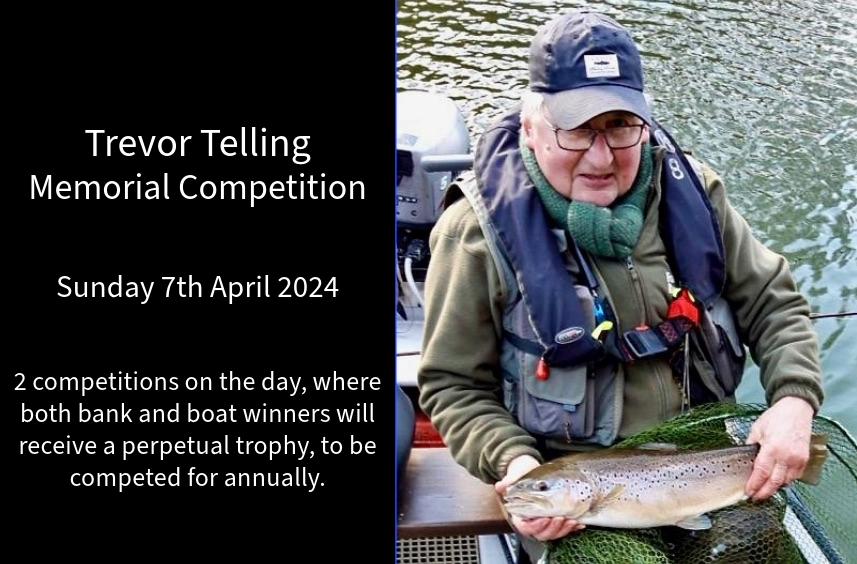
Wimbleball Lake, Sunday the 7th April 2024 and annually thereafter.
2 Fishing competitions in 1, from the boat and the bank, trophy & prizes for each.
Normal price for fishing plus £5 donation to charity.
The charities being supported are the South West Fishing for Life and the Exeter Hospicecare team.
For those that knew Trevor, and for those that didn’t, we are holding this match to commemorate a man who simply loved all fishing but especially fly fishing. His local knowledge of Wimbleball, Trout feeding habits and what flies and line to use and when, were readily shared with fellow anglers, he was much respected and a “one of a kind”.
The day will start with registration at the gazebo by the boat ramp between 8:00 and 9:00. The Fishing Competition will start from 9:30 with a weigh in at the end to be determined.
Entries on the day can be paid either by cash or cheque, boats should be booked in advance as normal, bank fishers can book online or turn up on the day & pay in the hut.
Some of Trevor’s “recommended” and favourite flies will be on sale on the day, all monies raised will also go to the charities.
2 shields are awarded, one for boat fishing and one for bank fishing. The winner keeps the shield for the year and is asked to ensure it is returned ready for the competition next year.
Karen, Charlotte, Matthew and Arthur thank you for supporting these 2 charities which meant so much to them during Trevor’s illness and hospice care and Trevor of course supported the south West fishing for life charity, teaching ladies to cast and enjoy the peace and tranquility of fishing after their own personal experiences of cancer.
Please share and get as many anglers who knew Trevor to come along, enjoy a fish and pay their respects…
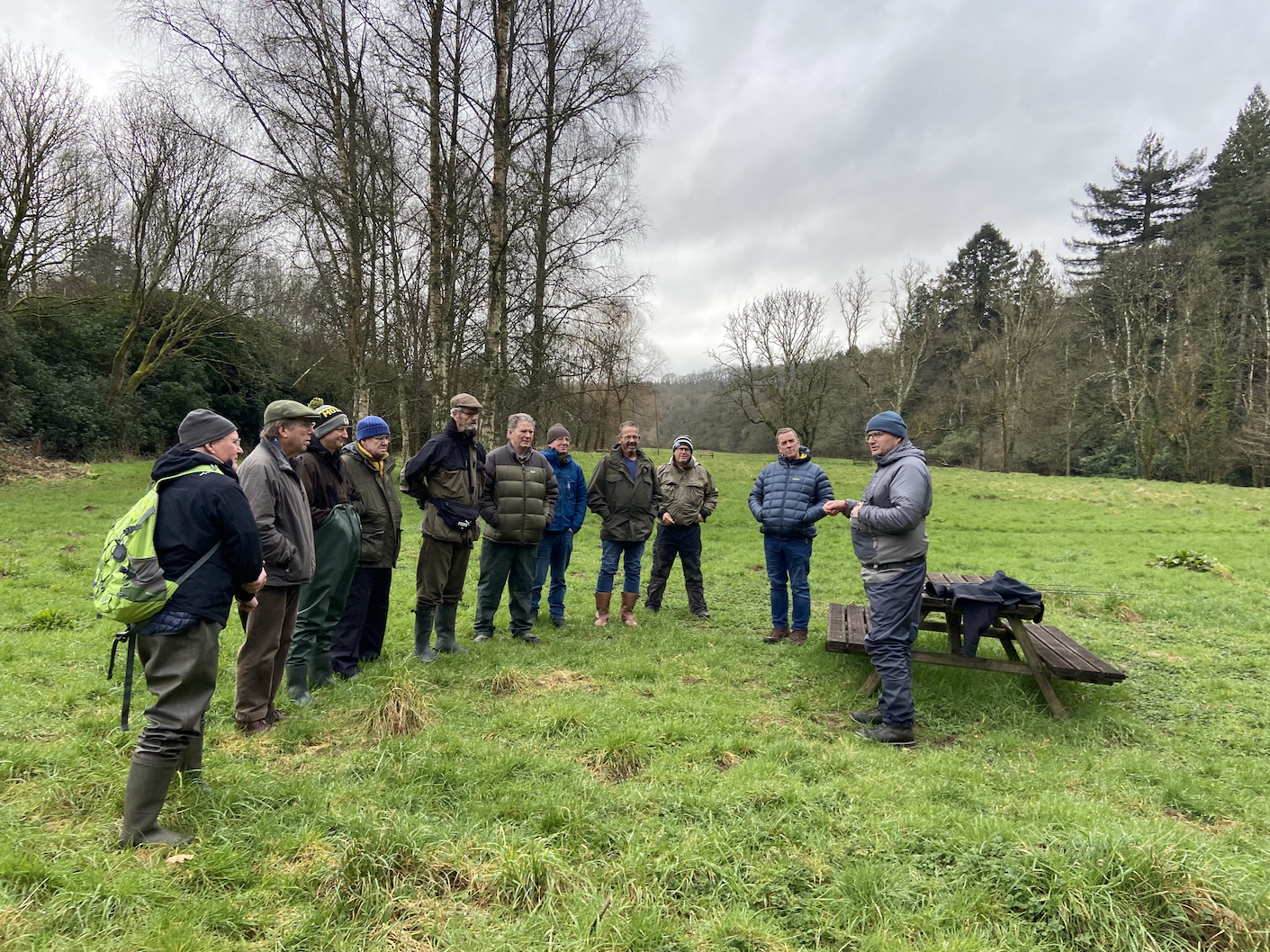
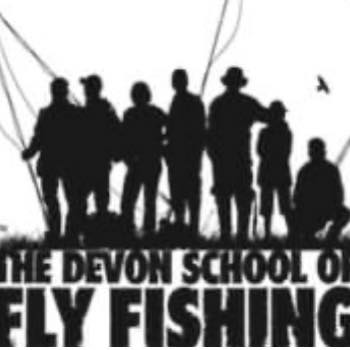
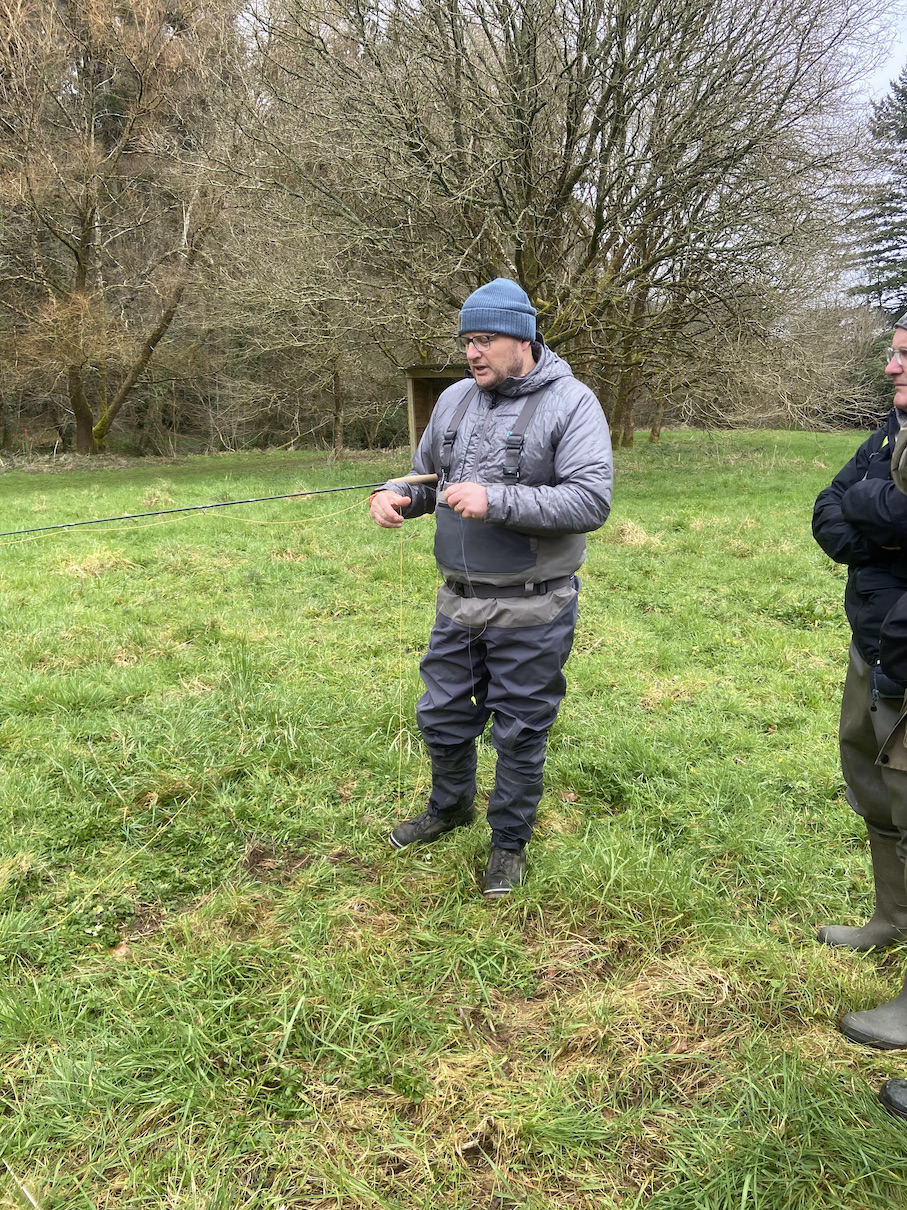
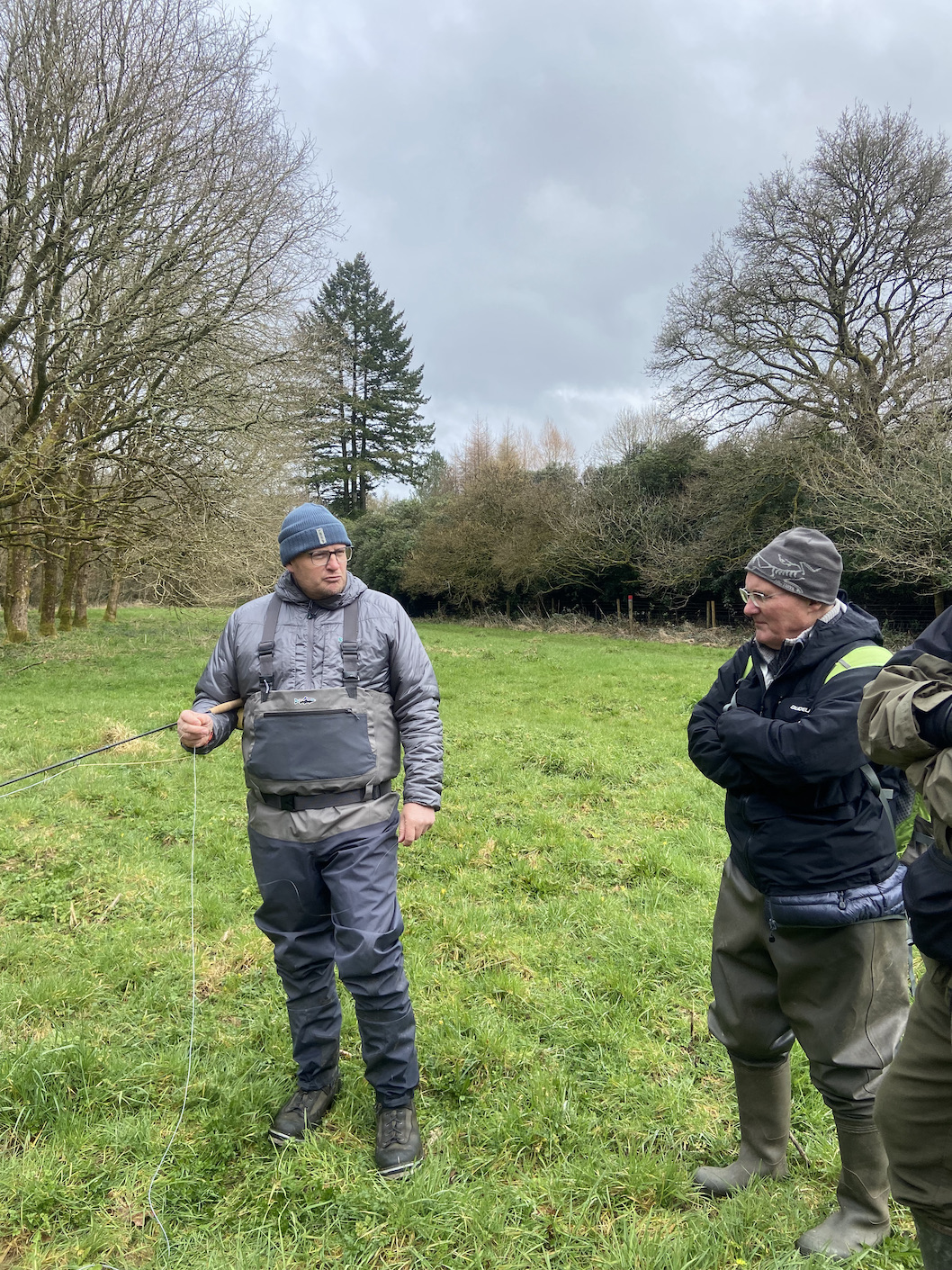
I was privileged to be invited to attend the Taw Fishing Club AGM at the Fox and Hounds at Eggesford last Saturday. The Taw Fishing Club has five and a half miles of fishing on the Upper Taw and its tributaries offering some excellent fishing for wild brown trout.
I arrived at 10:00am to join members in the field adjacent to the River Taw where Gerald Spiers of the Devon School Of Fly Fishing was offering a casting clinic for members. It was good to be close to the river with the evidence of Spring all around. Gerald chatted about the intricacies of casting and fly presentation in depth. Engaging the audience in discussion on mending the line, fly choice, reading the water, casting loops, arc, wrist position, and how to approach the water. He also discussed the finer details of tackle choice advising on leaders, tippets, rod choice and line care. I am sure all walked back to the hotel for lunch enthused for the coming season and eager to employ the knowledge imparted by Gerald. The art of fly fishing and fishing in general is a never ending game of interaction with nature that offers an absorbing fascination that can never be quelled once hooked.
Members and guests mingled over lunch and engaged in conversations that I feel sure contained many fishy tales. On our table the fishy agenda drifted into the toxic world of politics and the environment. It seems increasingly apparent to me that populist politicians are leading the human race on a slippery road to extinction. Failure to acknowledge uncomfortable truths to ensure election is a symptom of a generation that is increasingly disconnected with the natural world.
The Taw Club has been running successfully for over a century and is presently in a very healthy state thanks to a hard working committee Chaired by Gordon Murray with secretarial responsibilities carried out by Chris Searles. The club has a current membership of fifty and welcomes new members to its ranks. The Taw Club is a friendly group that offers plenty of opportunity to mingle and learn during club teach ins and bank clearing days.
The Chair addressed a large proportion of the membership at the meeting and highlighted concerns mirrored across angling clubs throughout the land. There was conversation around the aging dynamics of club membership and the need for a younger generation to take up rods on the water. Angling participation and social interaction has undoubtedly been impacted upon by covid and recovery is slow.
The health of the river was top of the agenda with a focus on working with landowners to safeguard the future. Gordon expressed his views on pollution and quoted the phrase; “ Kind Words butter no parsnips”. Farming incentives to deliver habitat improvement, River fly monitoring, Citizen Science Water Quality Sampling and the vital work of an underfunded Environment Agency was all discussed with passion. It is essential that this desire to safeguard our rivers is put into practice.
The Environment Agency was represented by North Devon’s Fishery Enforcement Officer Sam Fenner who engaged with the club members offering advice and guidance on a range of river related enquiries.
There was discussion around invasive species including signal crayfish and mink. The increasing population of beavers were also acknowledged which are generally thought to bring wide benefits to the rivers eco systems.
An exciting increase in shad spawning in the Taw system was noted with hope that this will bring focus upon the importance of the Taw system to this rare and endangered species.
Catches of wild brown trout across the club’s waters has been consistently good over recent seasons with between 300 and 500 trout registered by members each season. The use of an online recording system has been a very beneficial recording tool ensuring up to date information is shared across the membership.
The AGM was concluded with a talk from Gerald Spiers who gave some valuable advice on wading safely. His three top tips being to wade slowly and upright, wear studded waders and use a wading staff.
Membership details for the Taw Fishing Club can be found at :-
https://www.tawfishingclub.org/membership-and-rules
 http://www.lance-nicholoson.co.uk
http://www.lance-nicholoson.co.uk
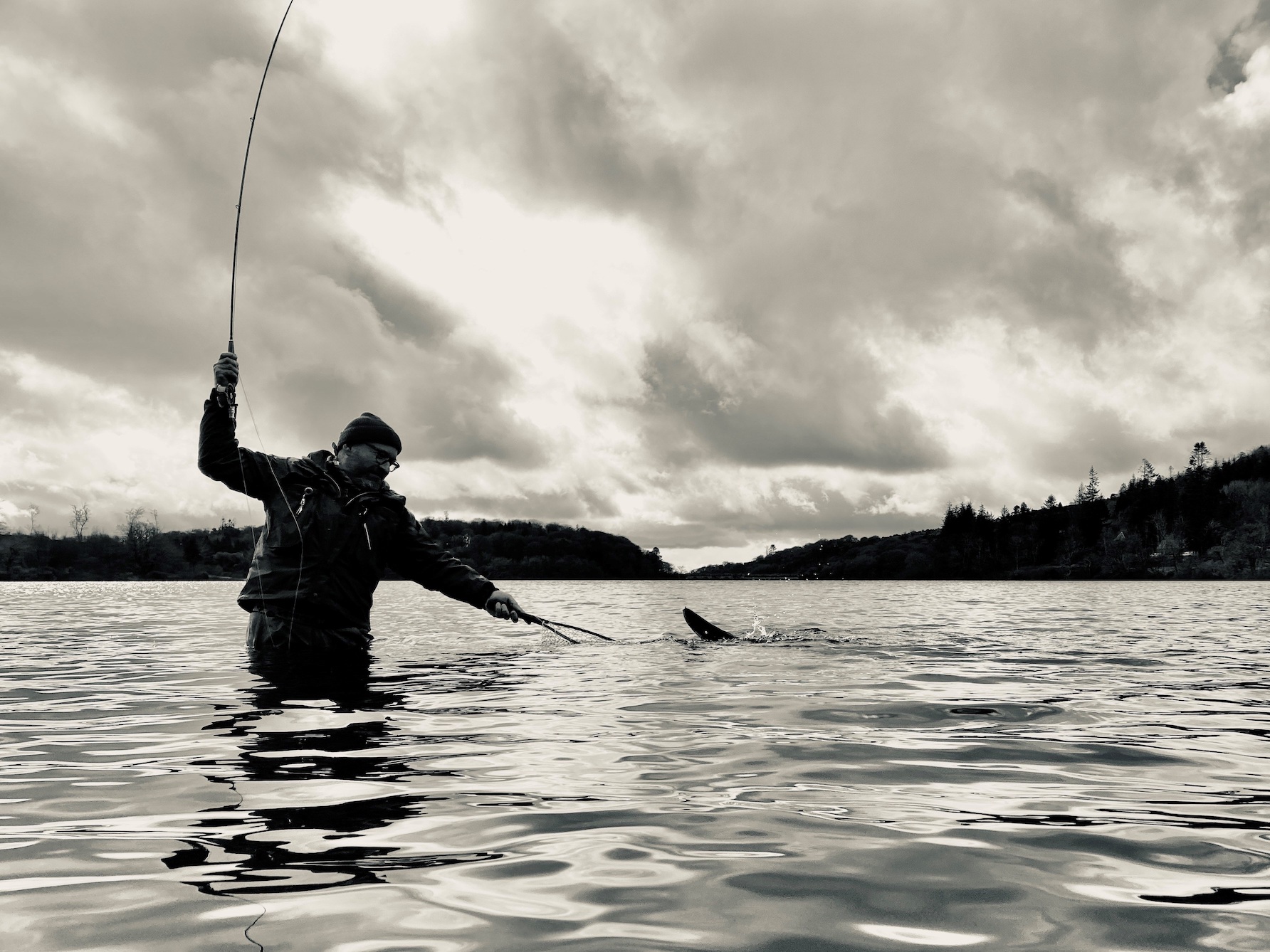
The new season is now firmly under way at the South West Lakes Trust trout fisheries, with the Rainbow waters opening on 3 March (with prior preview days for season ticket holders), and Brown Trout due to open on 15 March. Where available, boats are now on the water, and should be pre-booked (online or via the telephone). Generally the weather for the opening weeks has been challenging to anglers, and in spite of strong winds, rain, snow and hail, and cold temperatures, the fish have already started to feed near the surface, with many caught using floating line tactics. The very wet winter means that the waters are at full capacity.
Fishing:
Kennick – Rods averaged over 5.5 fish per angler during the opening sessions, with fish generally located along the western bank and in the Narrows, with bank anglers catching well. A selection of nymphs (Buzzers, Damsels and Montanas) and lure patterns (Tadpoles, Kennick Killers, Black and Blue Fritz and Black and Green Woolly Buggers) fished on intermediate and floating lines with various retrieves proved most successful. The best fish, a rainbow of 3lb 13oz, was caught by Mike Malpas.
Siblyback – The season opened on excellent form – anglers averaged 4.8 fish per rod, with fish mainly located along the North Bank, Two Meadows and Stocky Bay. While some fish were caught on Montana Nymphs, most were caught on a variety of lure patterns (Cormorant, Kennick Killer, Snake, Blob and Siblyback Sparkler) fished on floating lines with a medium retrieve. Ron Wilday (from Liskeard) caught a bag of six rainbows to 1lb 12oz in Stocky Bay.
Burrator – the season opened with a flying start, with anglers averaging 8.6 fish per rod, mainly from Longstone, Pig’s Trough, Lowery Point and Back Bay. Intermediate or floating lines with a fast retrieve proved to be the most successful method, with fish feeding on small flies on or just below the surface. Successful flies included Damsel Nymph variations, Black Fritz, Humungous and Distressed Marabou patterns. Simon Stokes (from Horrabridge) caught the best fish, a rainbow of 2lb 8oz, using an intermediate line fished down to four feet depth, with a medium to fast retrieve. Jonny Mac (from Plympton) caught ten ‘fighting fit’ rainbows to 2lb, chasing stripped lures down to 6 feet below the surface.
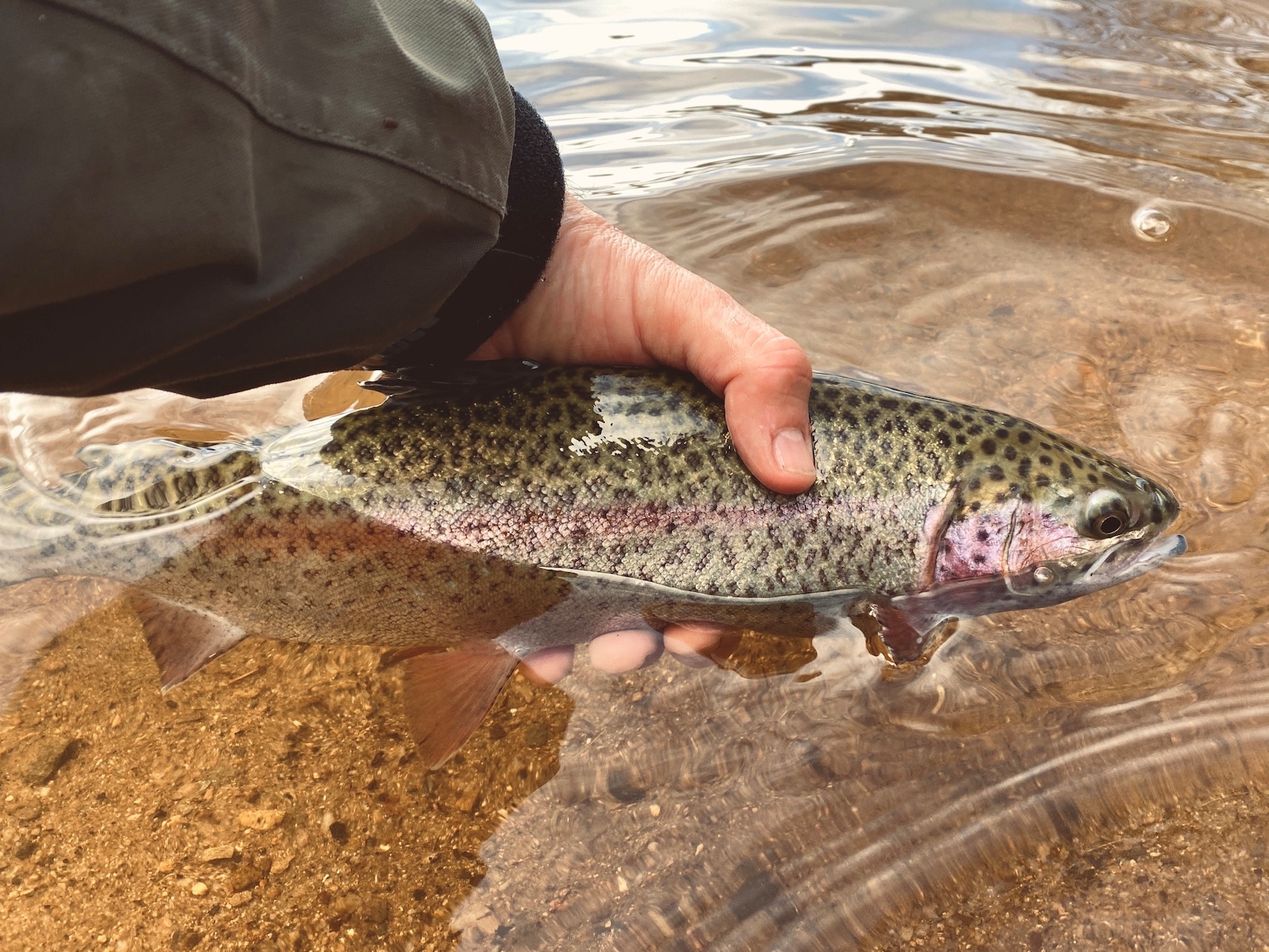
Stithians – the cold windy conditions made the opening weekend’s fishing challenging, with anglers managing to average only one fish per rod. Fish were mainly located at Pub Bay, Hollis, Sailing Club Bay and Carmenellis, with slow-fished lure patterns (Black and Green Cats Whisker, Cormorant and Blob patterns) fished on a floating line, but letting the fly sink well before retrieving, proving to be the most successful.
Another successful Fly Fair was held at Roadford Lake on 25 February, with fly-tying demonstrations, casting lessons and trout cookery demonstrations. Charles Jardine opened the event, which also included a variety of tackle and fly-tying suppliers, ‘Coarse fish on the Fly’ by Dom Garnett, a chance to meet local clubs and some bargains to be had on the Kennick Club used-tackle stand.

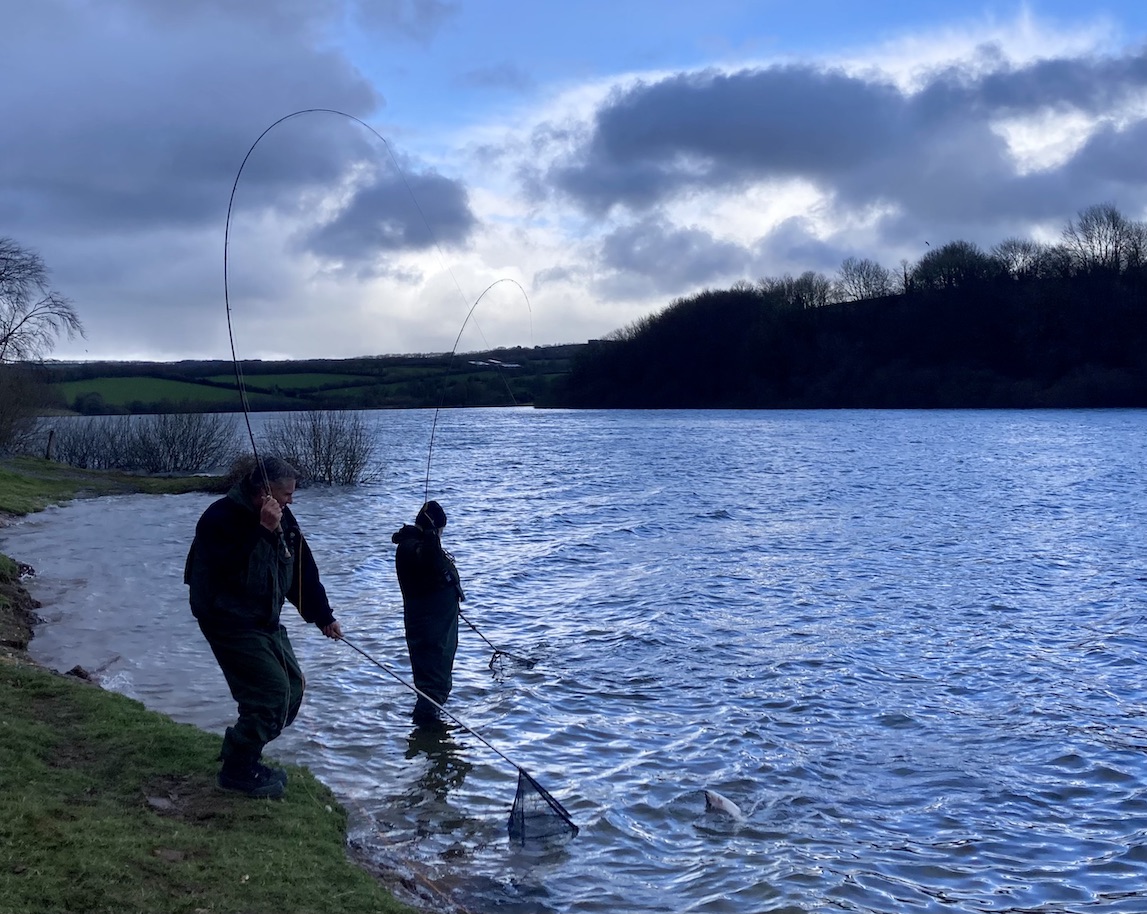
When my good friend Martin Turner sent a question via messenger saying he was going to Wimbleball mid-week would I go for bank or boat? As luck would have it I already had the day pencilled into my diary and asked if he minded me joining them on the bank?
A few days later I convinced Martin that there was no rush to get at the water for early dawn and as a result we decided on stopping off at Dulverton for breakfast. We walked into The Copper Kettle Cafe at around 9:15am and ordered up their mini breakfast and hot drinks. Half an hour later we set off glad we had gone for the rather adequate mini breakfast.
Martin and I have always plenty to discuss and had talked non stop since leaving my house in Loxhore and had still not exhausted the agenda when I climbed out of the car an hour after dark following the days fishing.
It had been a bright and sunny day with a strong East to SE wind adding a bite to the moorland air. We had decided to start off near Bessom’s but on meeting Martins friend Mike Snudden walking the path and reporting no action we changed our plan and diverted to Rugg’s that was sheltered from the cold wind.
I had been absent from Wimbleball for far too long and was eager to re-engage with this water that has a beguiling wild feel. It’s hard fighting rainbow trout are renowned amongst the Fly fishing fraternity testament to the hard work undertaken by Mark Underhill and his family over recent seasons.
Early March and to me fly selection is simple, surely any lure with black and green fished on an intermediate line is the order of the day.
We spread out along the bank and set about searching the icy waters emersed in our own worlds. I relished the cool water as I waded out to my waist, the chill water on the fingers as the line was retrieved. I expected that thrilling pull at any moment as I settled into the rhythm of cast and retrieve.
I took stock of the surrounding rolling hills, the stark bare trees of early spring, blue sky and occasional fluffy white clouds. The margins were populated with frogspawn and melodic bird song drifted on the chill wind.
I was surprised not to have caught after close to an hour and strolled over to Martin and Mike who were engaged in conversation with a fellow fisher.
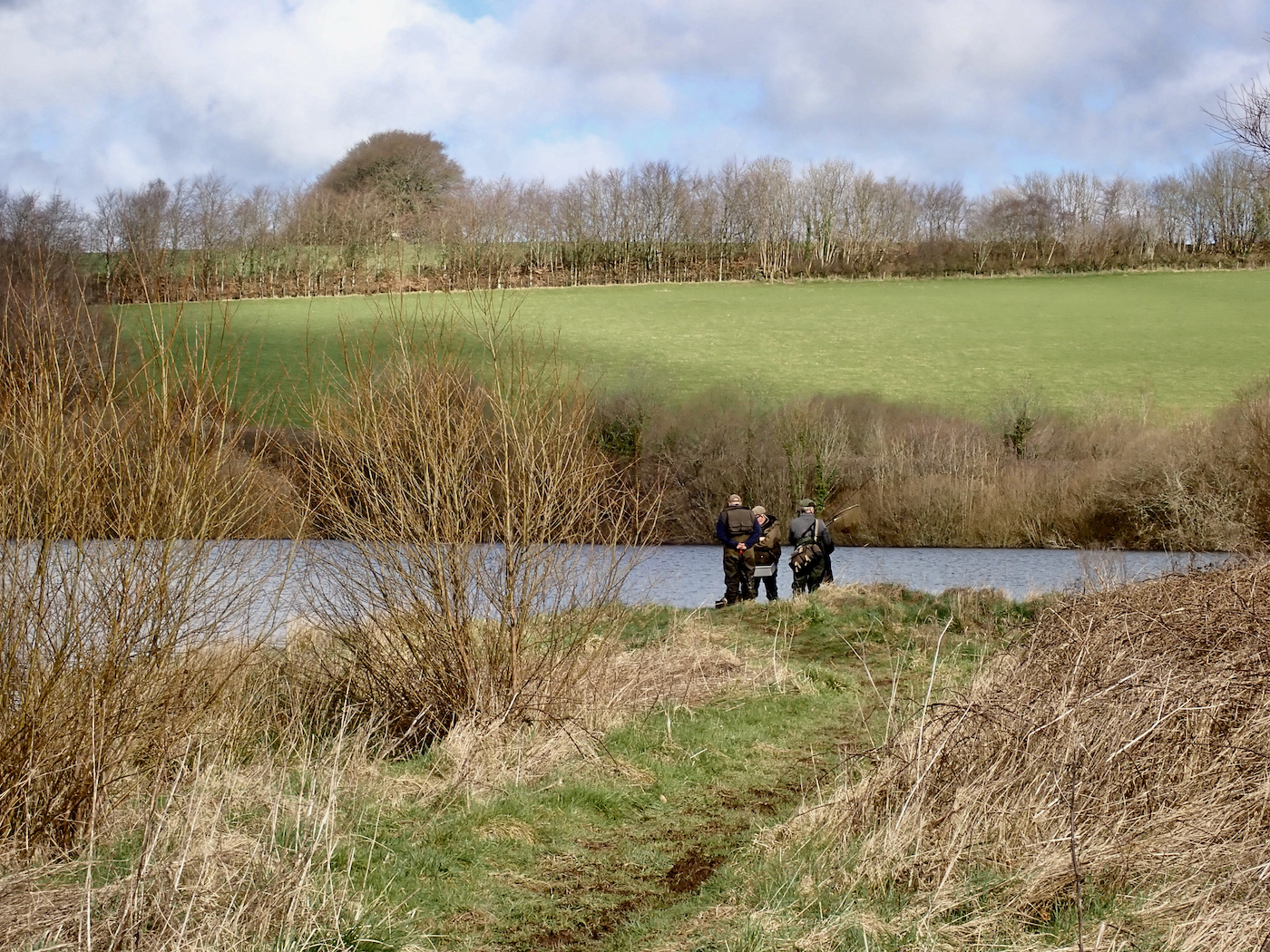
The angler was Chris Guest who I had engaged with frequently on social media over recent seasons. It is always good to meet in person and we chatted fluently for several minutes comparing notes on bass, trout and books.
My theory on not needing an early start proved questionable as Chris had caught nine trout before we arrived with ice in the margins.
As Chris had not caught whilst we were present we decided upon a move to a new area.
The boat launching area has been kind to me in the past and it was to here that we moved. Punching a line into the bitter cold wind proved hard work and I soon had an urge to move to an area with a little more shelter where I had enjoyed success on previous trips.
In truth it was good to have a brisk walk and warm up a bit after several hours fishing. I had foolishly tempted fate earlier boasting to Martin and Mike that I had not blanked at Wimbleball since its new era.
After half an hour of searching the water I was delighted to feel a savage pull through the line. A large rainbow trout of perhaps five pounds erupted from the water, a couple of yards to the left there was another swirl as another large trout appeared in a flurry of spray! The result was inevitable as the two trout that had seized two flies on my cast headed in separate directions!
A few minutes later Martin and Mike arrived to hear my tale of woe. Mike had banked a good rainbow of around 2lb whilst Martin remained devoid of any action.
My line zipped tight once more and for a few moments I enjoyed brief connection with what looked and felt to be a good trout. I missed one more trout but by now I was feeling confident and expectantly fished eventually avoiding a blank day with a slim full tailed rainbow of just over 2lb.
I was delighted to look across to Martin fishing fifty yards to my right his rod bent over a fish leaping clear of the water in a flurry of spray. After an exciting tussle a lovely rainbow of well over 3lb graced the net.
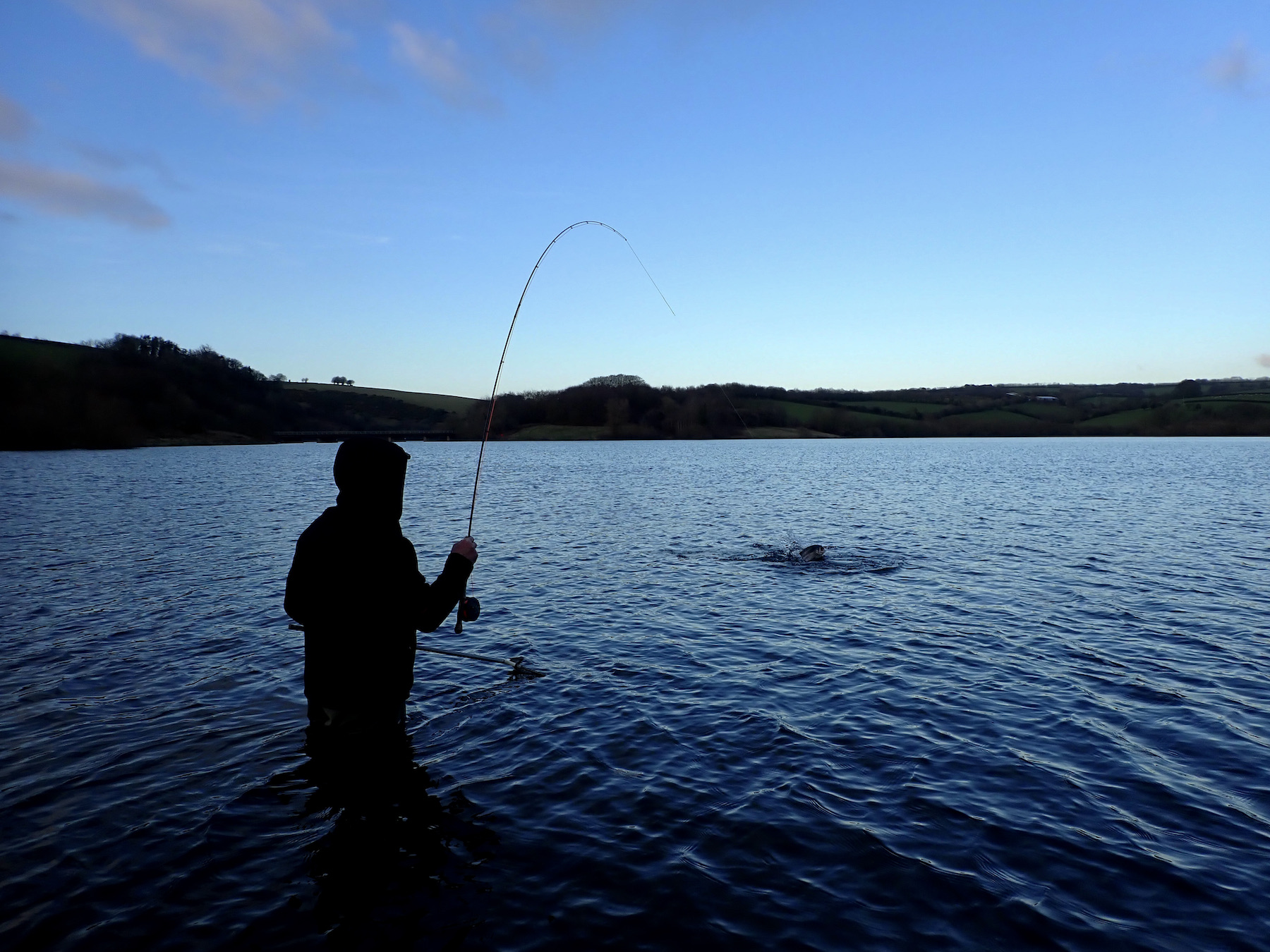
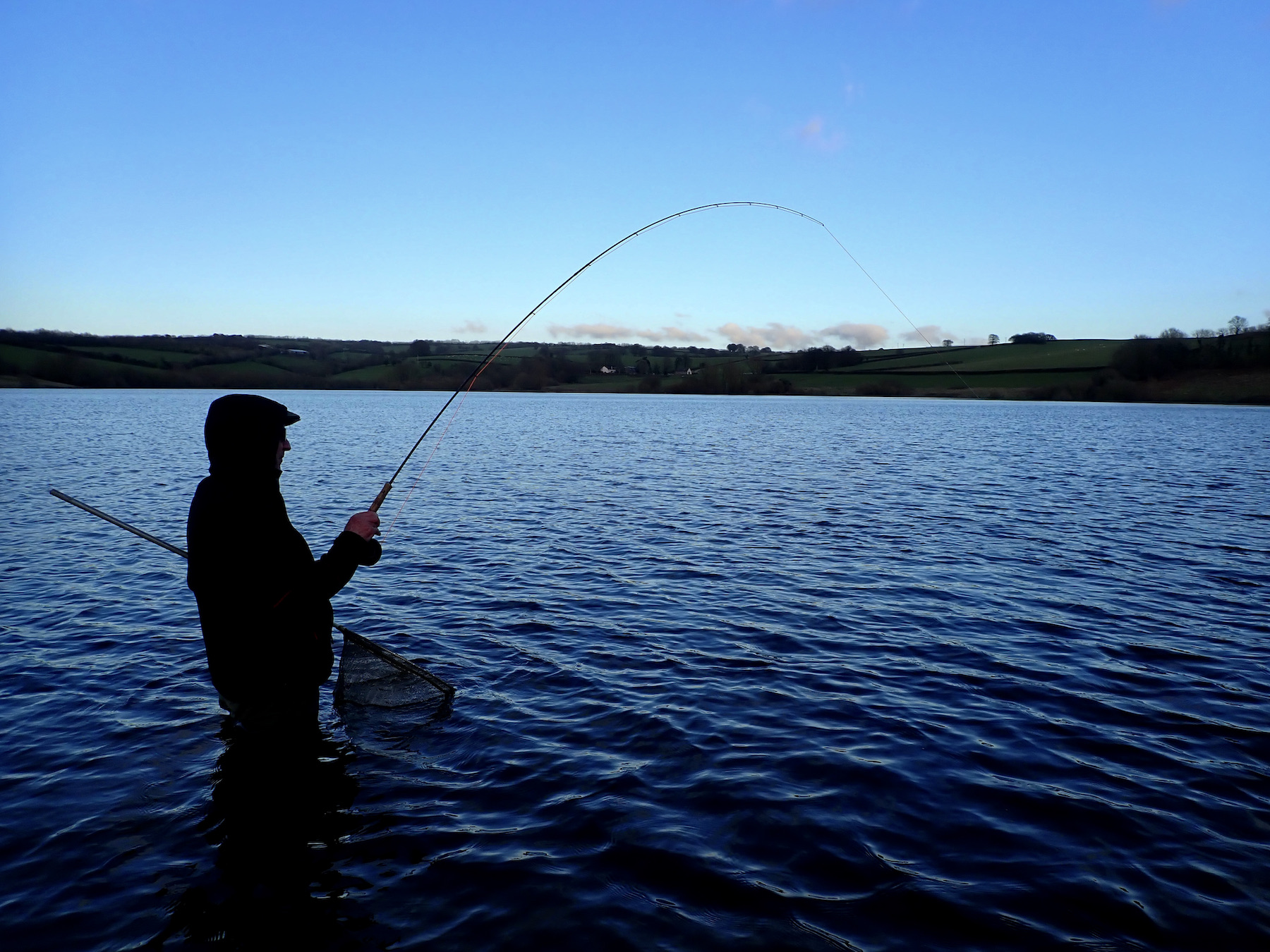
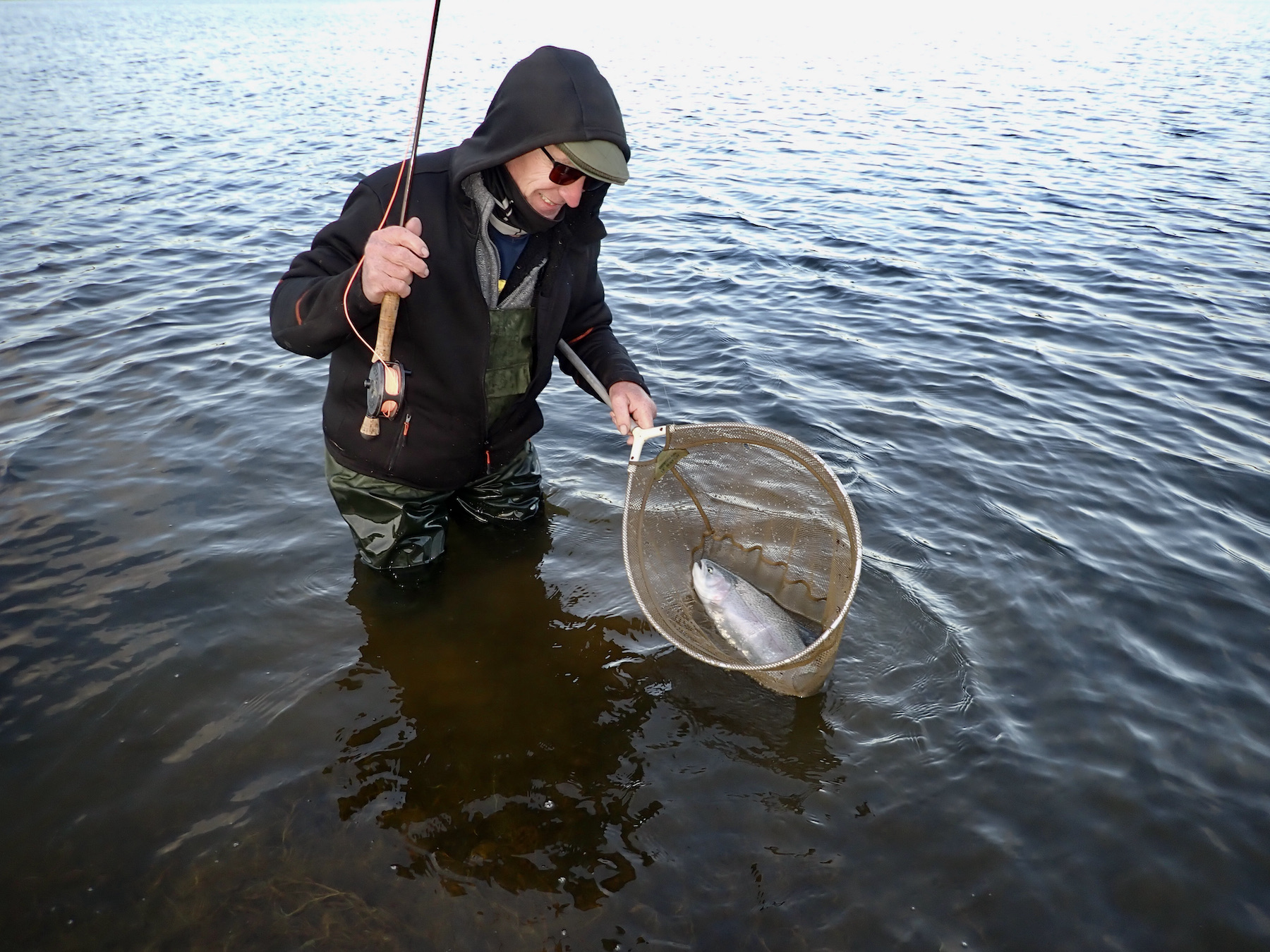
I soon added a second rainbow to my bag a chunky fish of perhaps 3lb 8oz and missed a couple of takes.
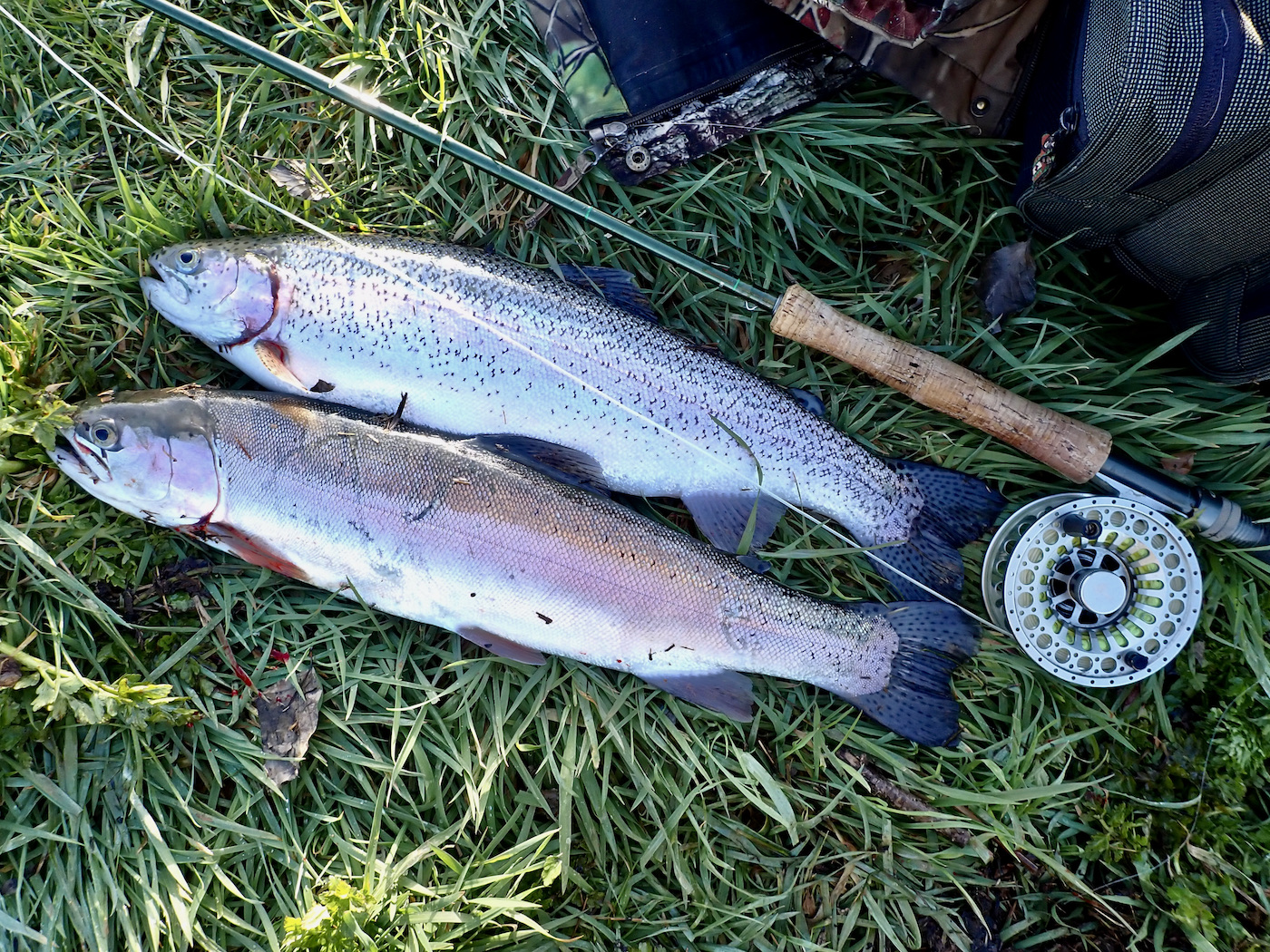
Once again Martin stood in the icy water his rod in a pleasing curve and his reel singing as a big trout surged to and fro. It was now close to five o clock and the sun was sinking slowly behind us. I stood beside Martin sharing the moments and snapped away trying to capture a few images of fishy drama in the slowly fading light of the day.
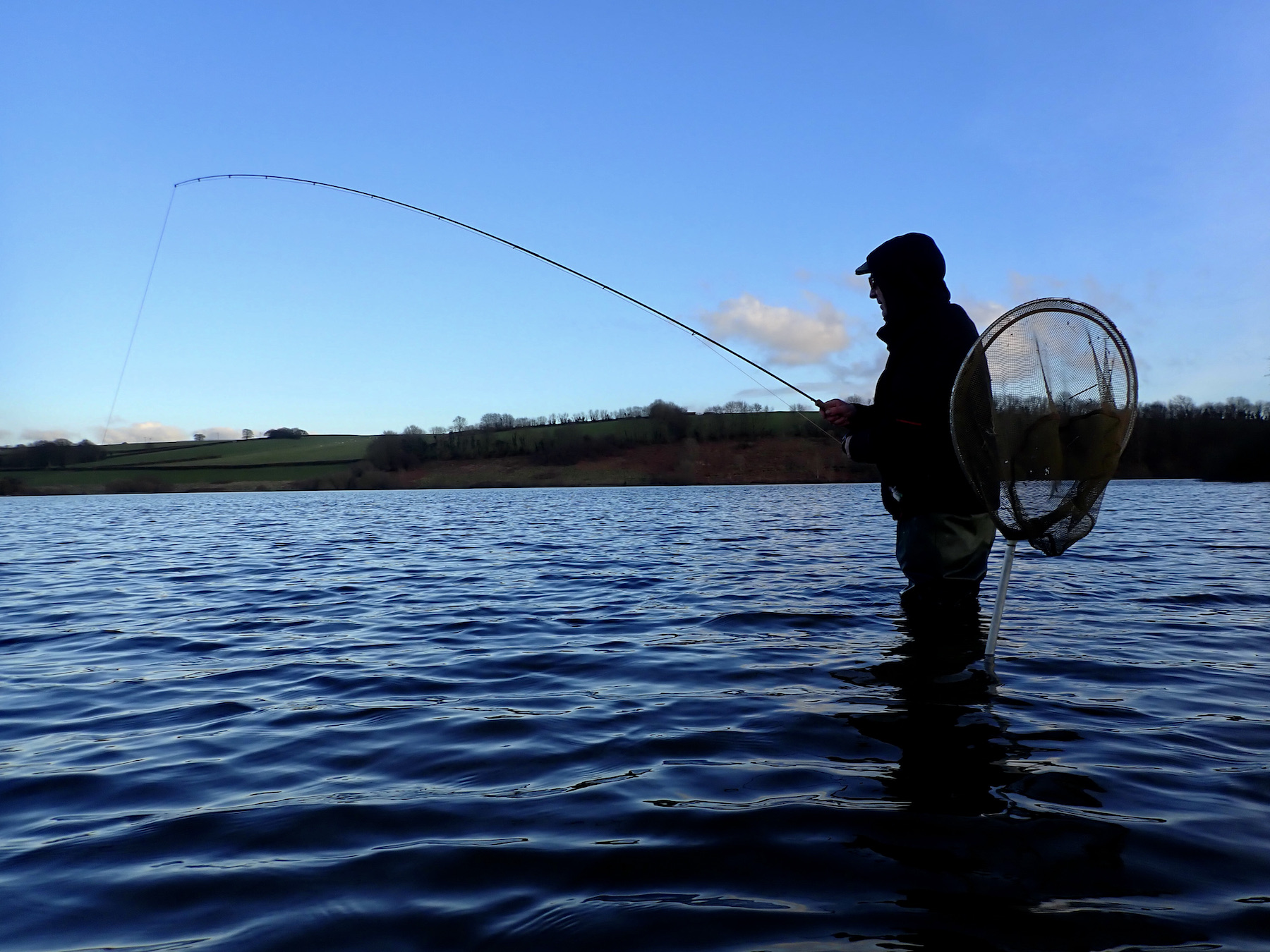
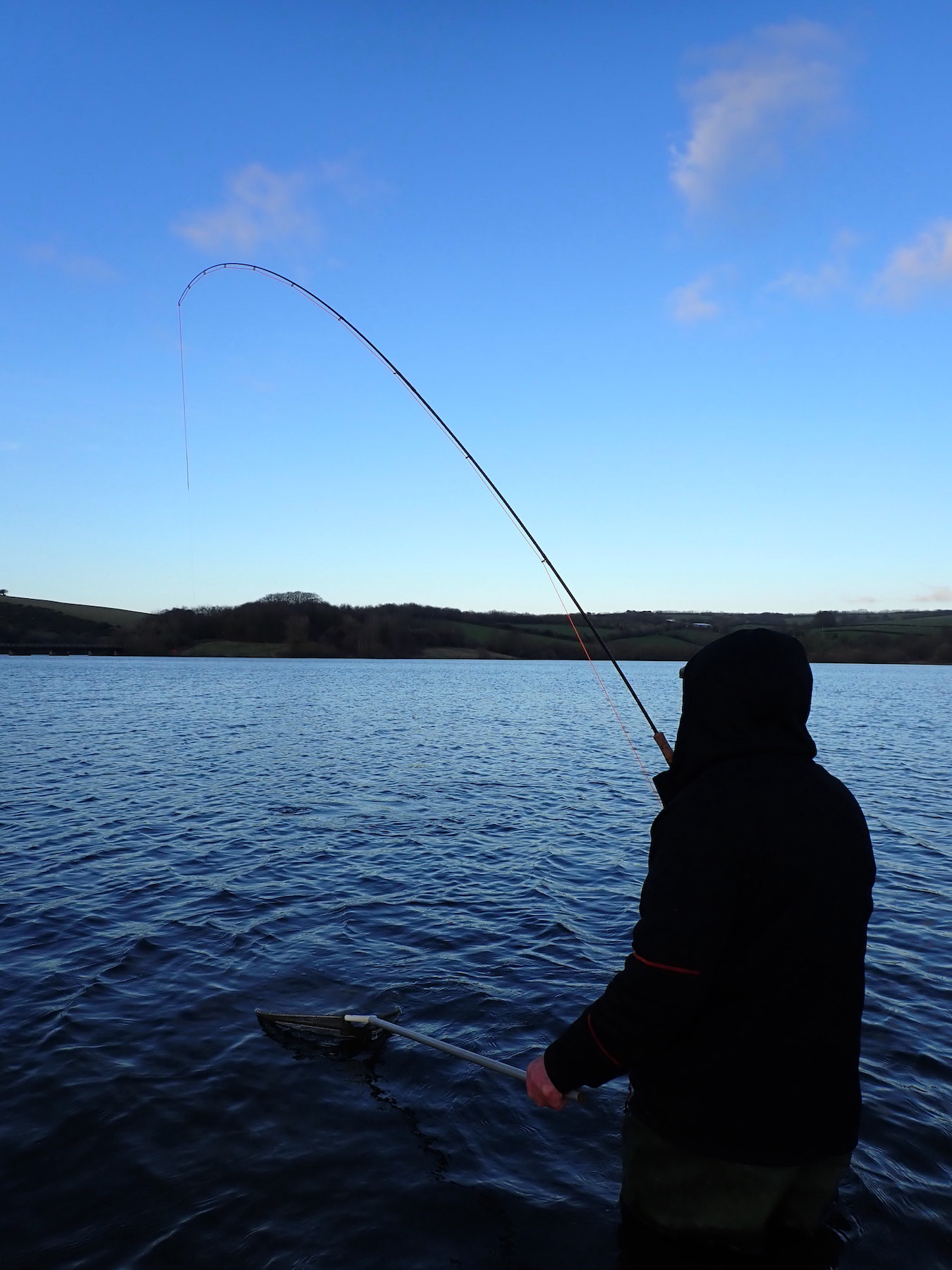
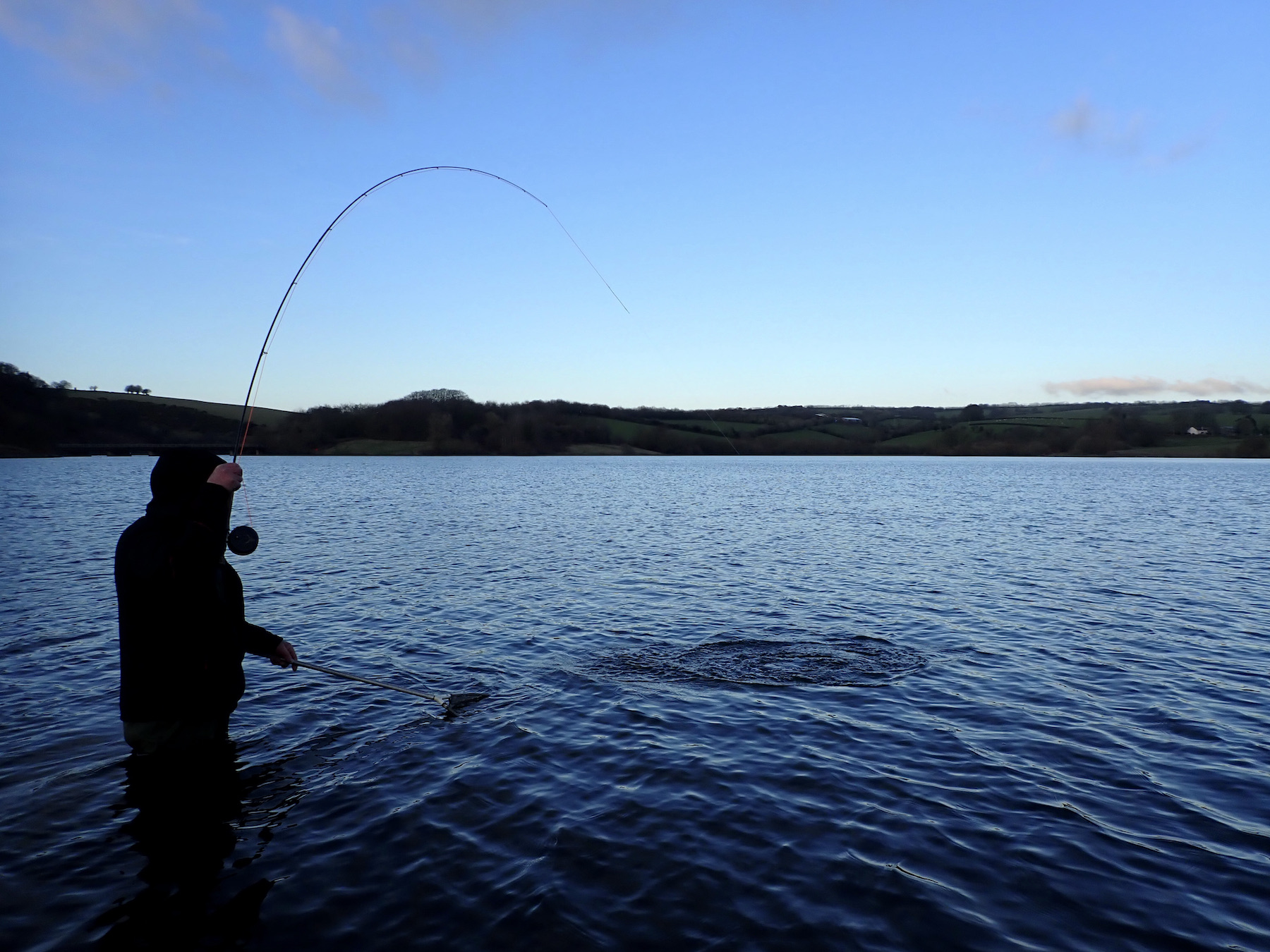
After perhaps five minutes a fine blue rainbow trout of close to five pounds was held aloft in triumph. Mike arrived back holding a fine rainbow of close to four pounds along with the tale of a large fish that had taken him to the backing before departing with his fly.
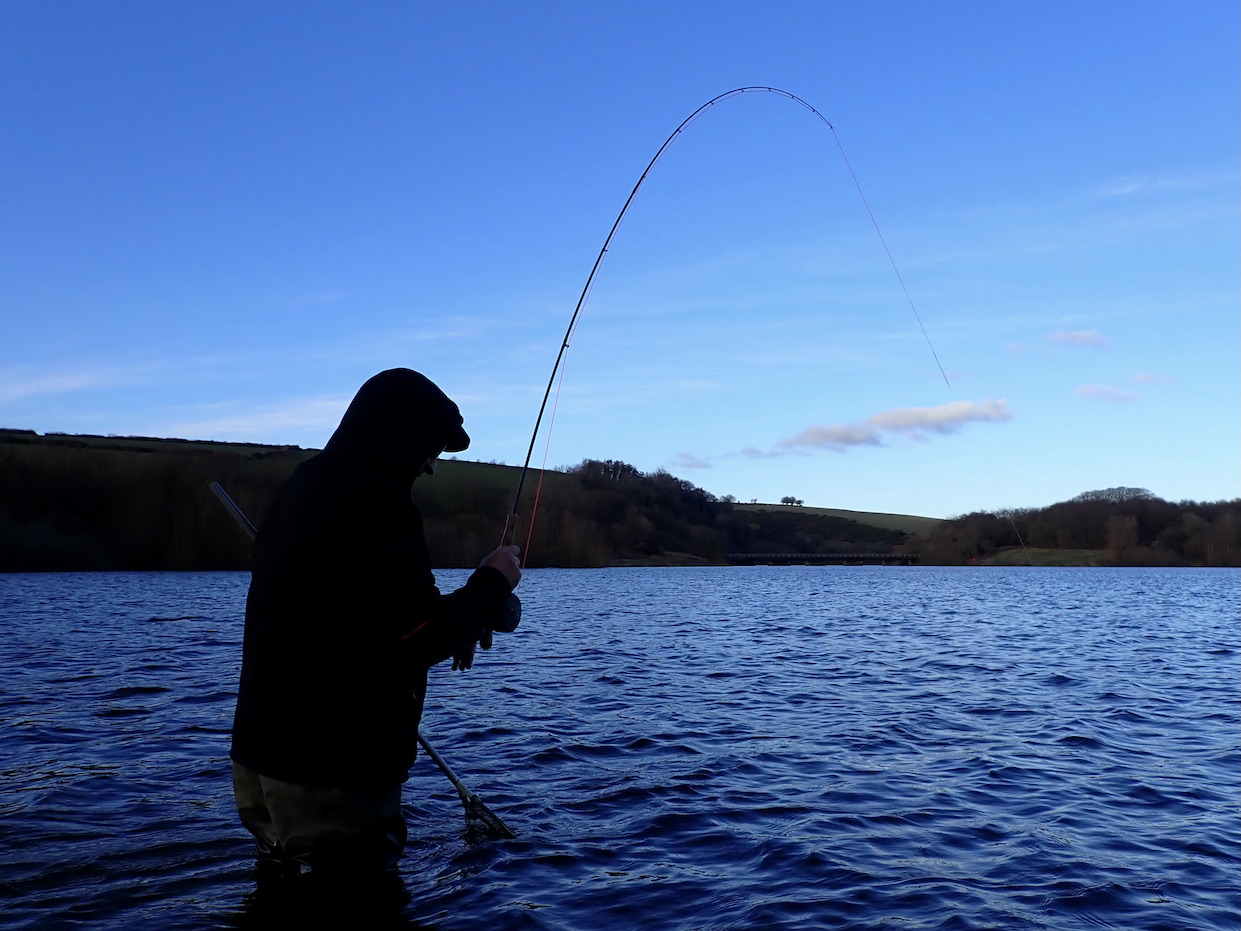
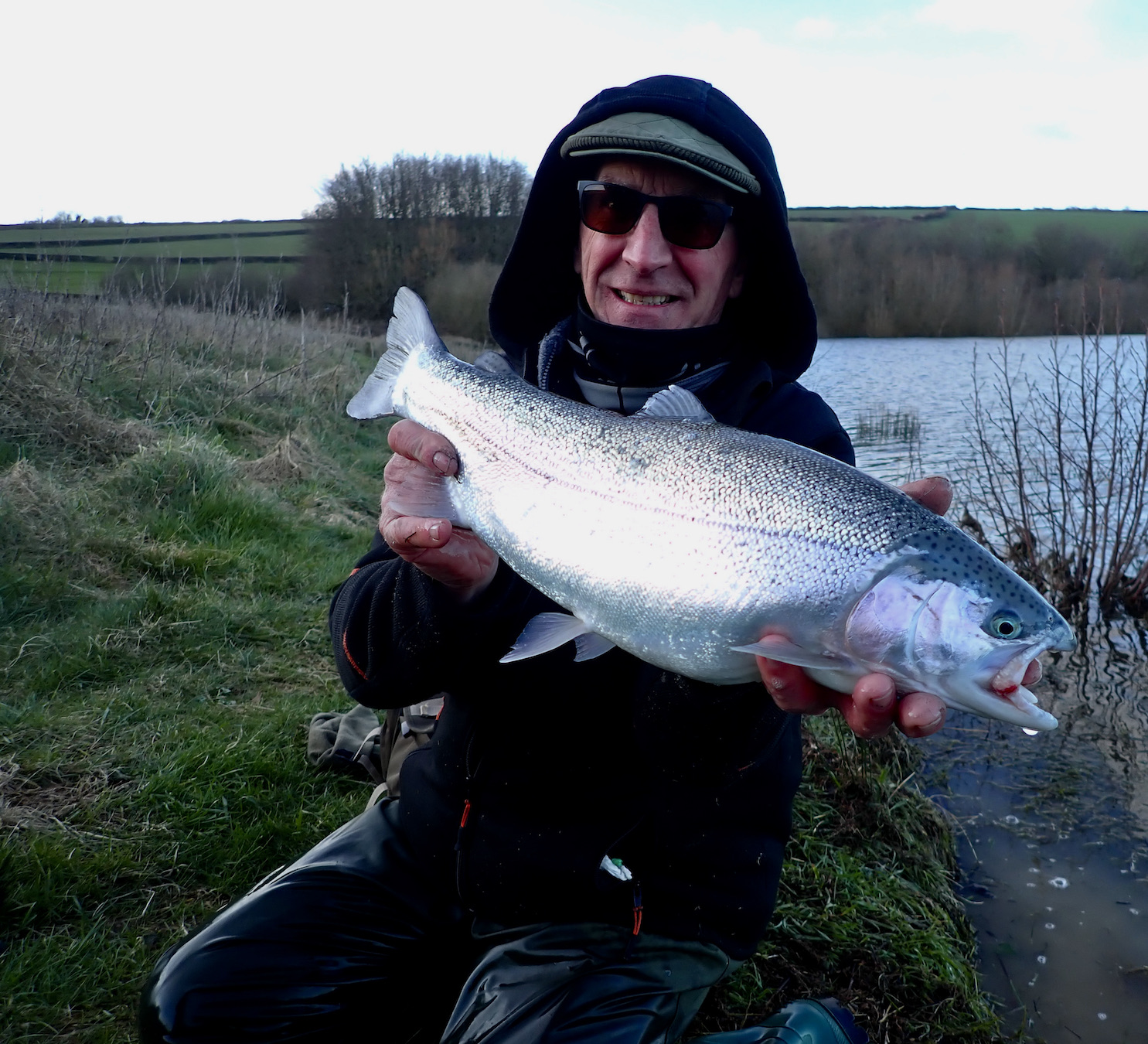
I grabbed a photo of Martin and Mike holding a pair of Wimbleball’s finest. Mike headed for home whilst Martin and I fished on eager for another connection as the chill of evening descended.
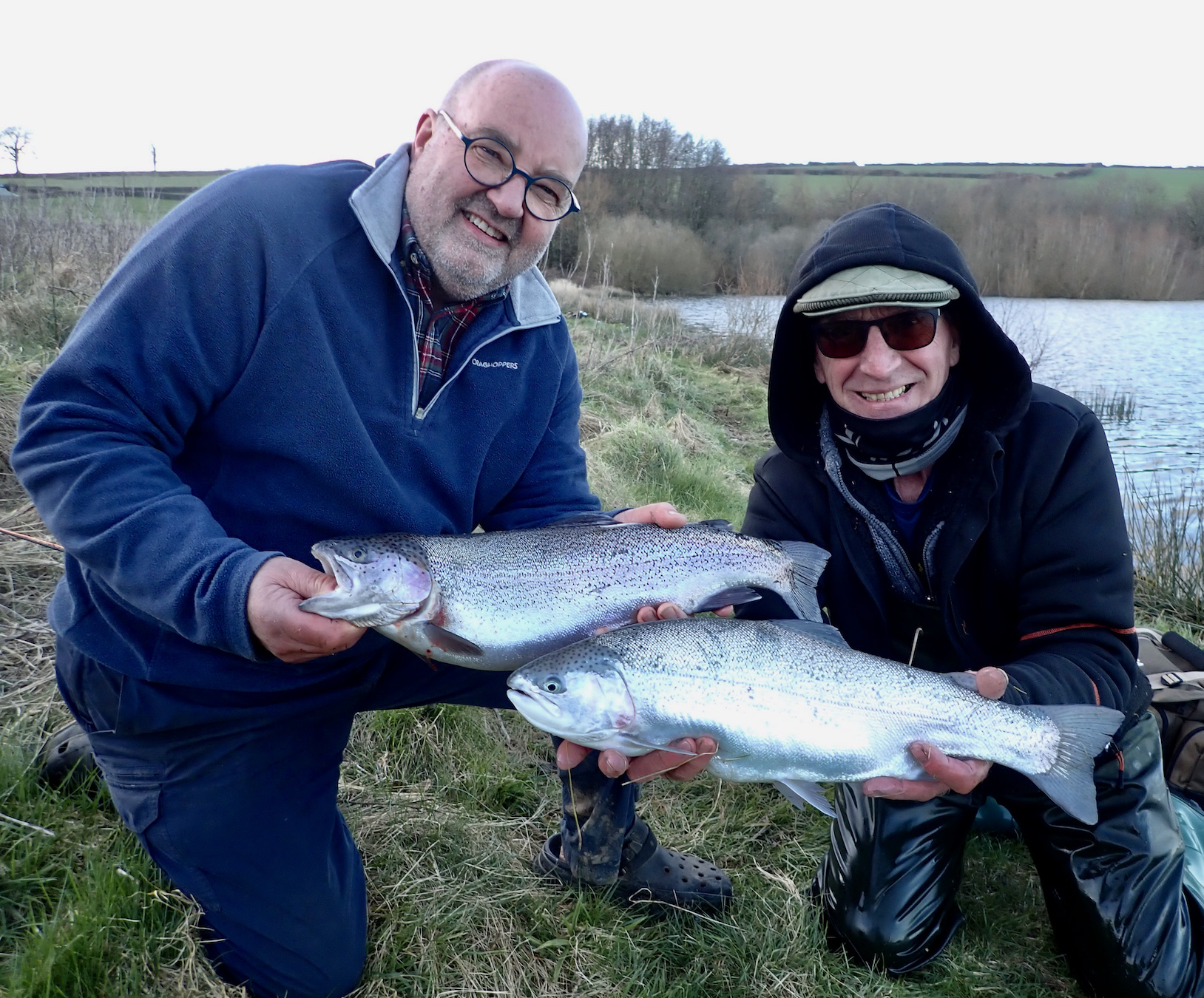
As we walked back the car holding a brace of rainbows each we reflected upon the day and how enjoyable it had been. Whilst we have had days with far more fish we both agreed that these days when its hard work are so often more memorable and rewarding.
These days of early season are so full of promise as we look forward to those warmer days when we will drift teams of buzzers in a gentle ripple driven by a warm southerly wind that will surely blow the bait into the fishes’ mouth.
Wind from the West, fish bite the best.
Wind from the East, fish bite the least.
Wind from the North, do not go forth.
Wind from the South blows bait in their mouth.
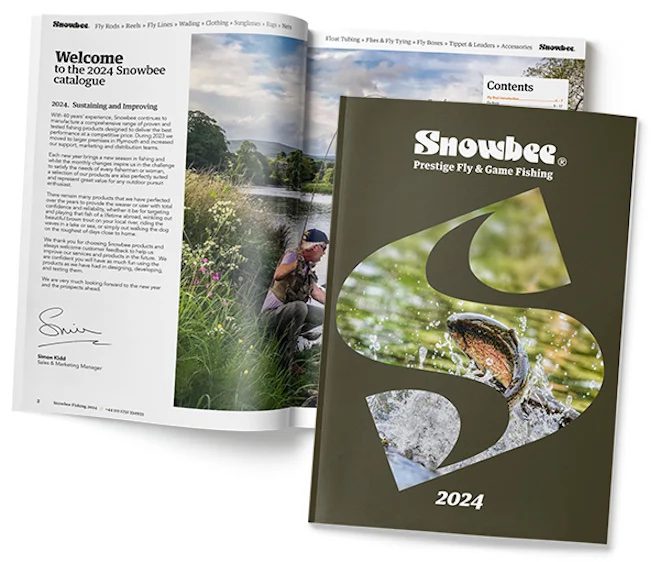
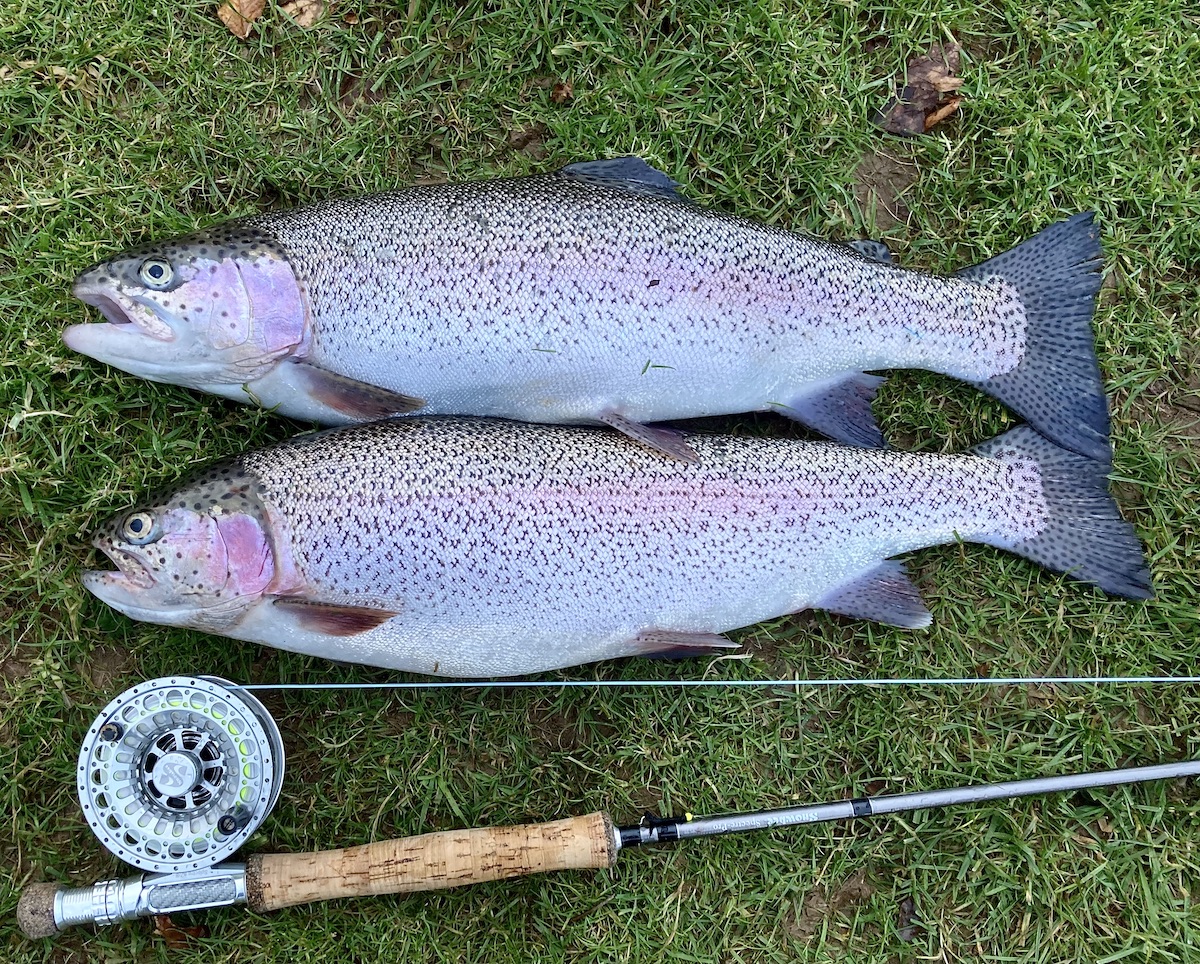
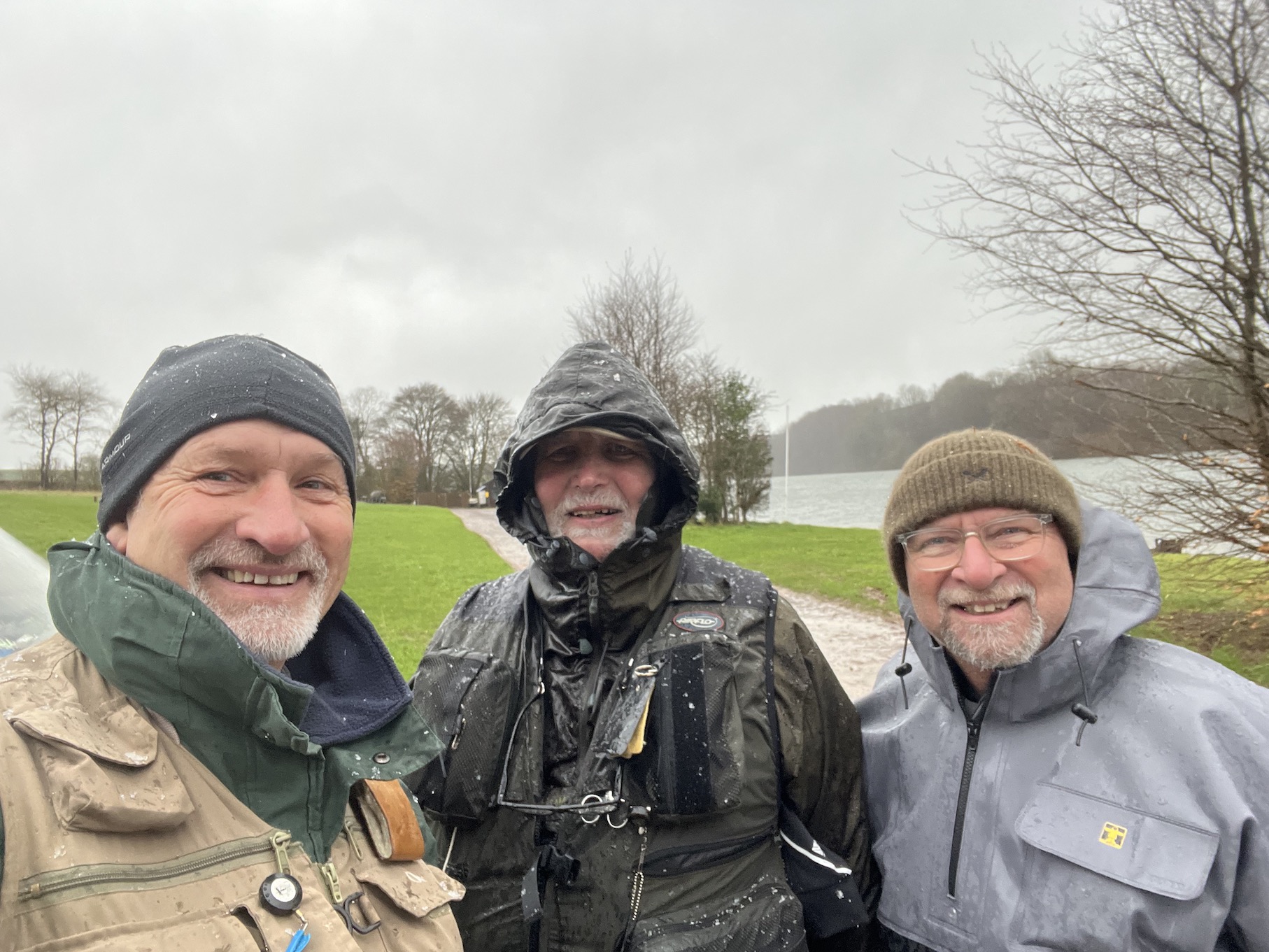

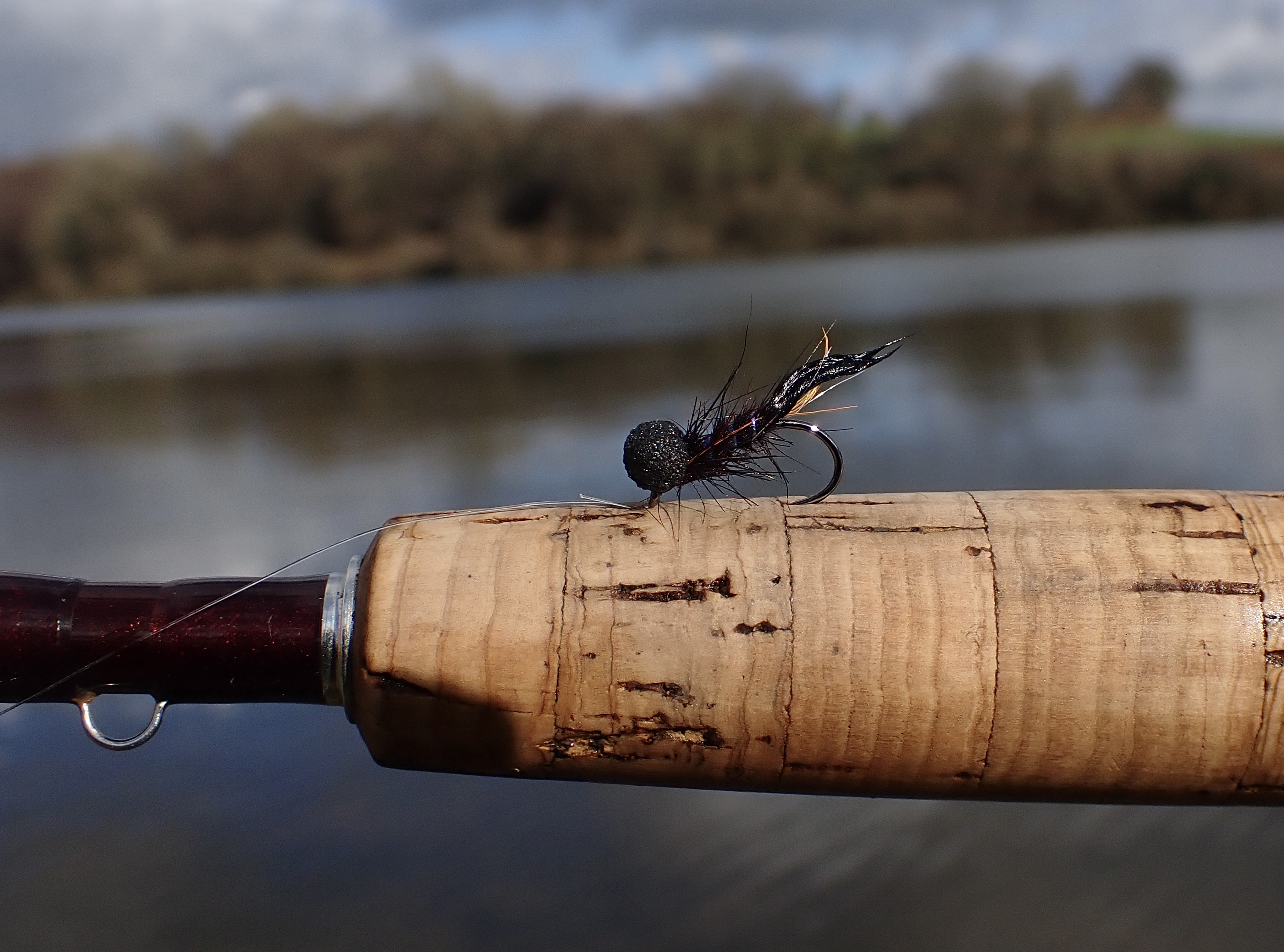

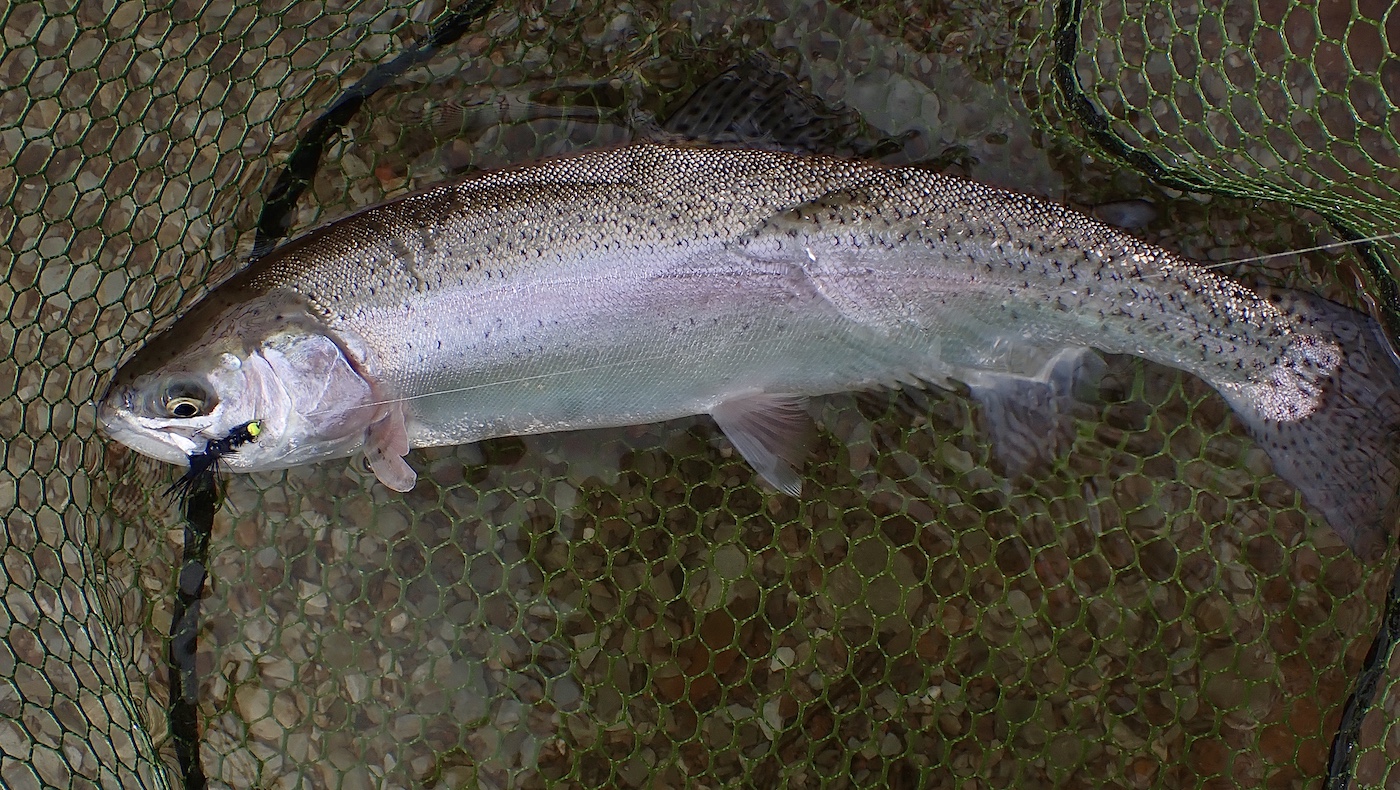

South West Lakes Trust hosted their annual Fly Fair at Roadford where Fly anglers from all over the South West converged for this ever popular curtain raiser to a new season. A wide variety of stands represented those involved in the Fly Fishing Community. The events main sponsors were Chevron Hackles, Holmleigh Angling Centre, Catch, Snowbee and Turrall.
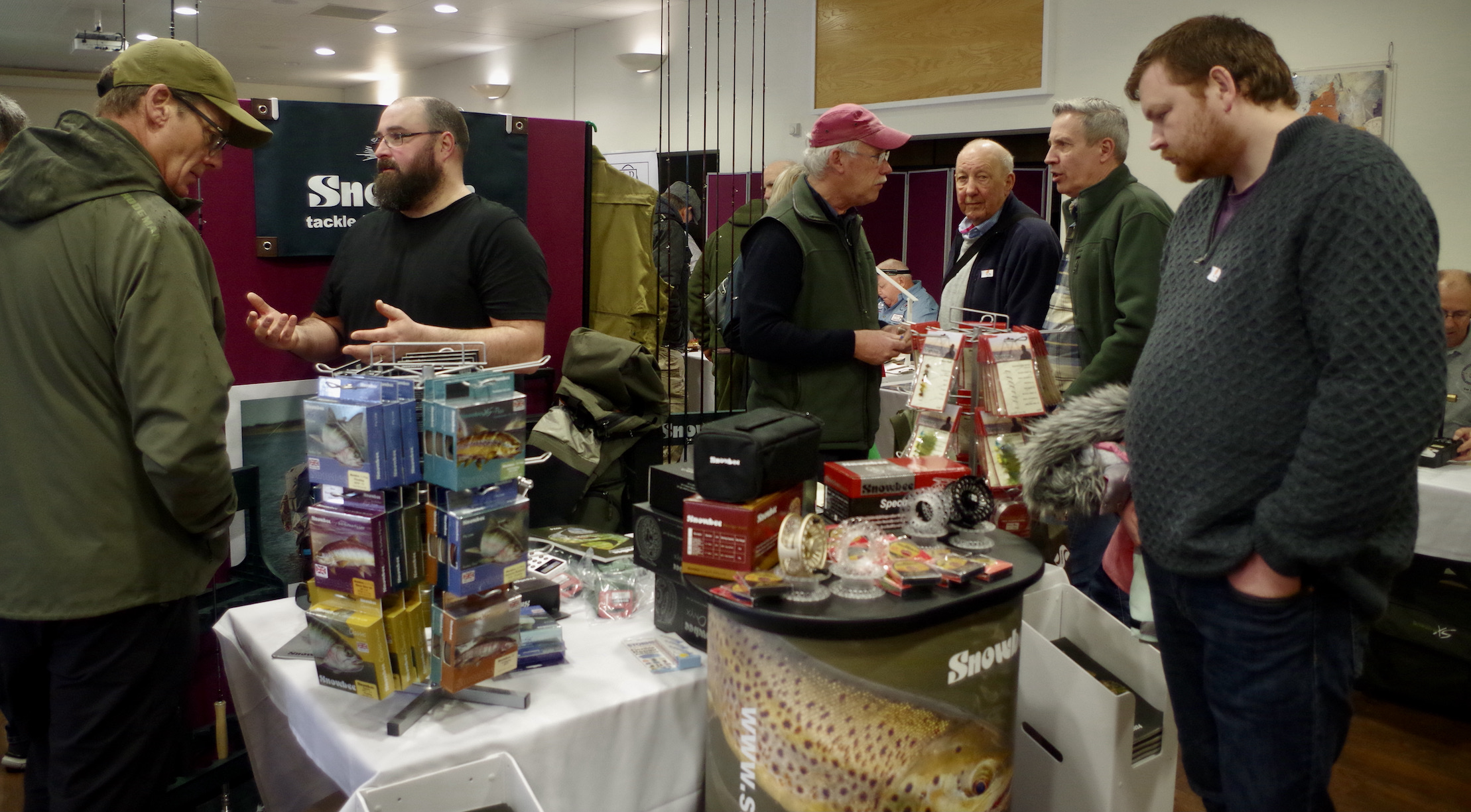
Charles Jardine opened the event stressing the need for anglers to get out fishing and support their local fisheries. He also spoke of the benefits of introducing young people into the fascinating world of fly fishing that has many positive benefits for mental health and general well-being.
Discussion flowed freely throughout the day with many plans set for the coming season. The long wet winter has undoubtedly impacted upon winter fishing with those fly anglers seeking sport with grayling and pike having a difficult time with only short periods when conditions were suitable to visit the water’s edge.
There has been considerable change over recent seasons as society has been impacted upon by Brexit, Covid and the cost of living crisis. Angling and fly fishing has of course been affected by all of this but it is perhaps even more important that our pastime thrives to bring much needed sanctuary from this gloom laden world.
Fly fishing has long been seen as a rather elitist branch of angling and when I started casting a fly fifty years ago the art of fly casting was still to some extent seen as a sport for the gentry.
The boom in Stillwater trout fishing during the 1970’s broke down these social barriers to some extent as a wider section of society enjoyed catching rainbow trout stocked into water supply reservoirs.
I remember being thrilled to catch the occasional limit bag of trout when I started out with the fish averaging around 1lb. As fisheries spread competition increased and small still-waters started opening stocking ever larger trout. Into the 1980’s and 1990’s double figure rainbow trout became a regular feature with some fisheries stocking fish to over 20lb.
This increasingly artificial commercial fishing resulted in ever increasing expectations from anglers. Another factor that perhaps influenced stocking was a significant increase in cormorant populations across reservoirs. The stocking of rainbows under 1lb 8oz became unviable as smaller trout were simply mopped up by these predatory birds.
Covid impacted upon us all but there was an initial post covid boom in fishing as anglers escaped to the great outdoors to enjoy a pastime that offered a safe environment. The value of fishing to mental health became much appreciated and for a time it seemed fly fishing was in a good place.
Sadly, the cost of living and angler’s unrealistic levels of expectation has resulted in an unsustainable situation. The spiralling cost of fish food and hot summers has impacted upon the farms that provide stock fish. The result is that fisheries are forced to pass the costs onto customers. In a cost of living crisis, it is very much a case of the survival of the fittest and as a result we are seeing the collapse of some fisheries Draycote Water in the Midlands being a case in question.
So having painted a rather gloomy picture of the fly fishing world in this country I will now look for those proverbial green shoots.
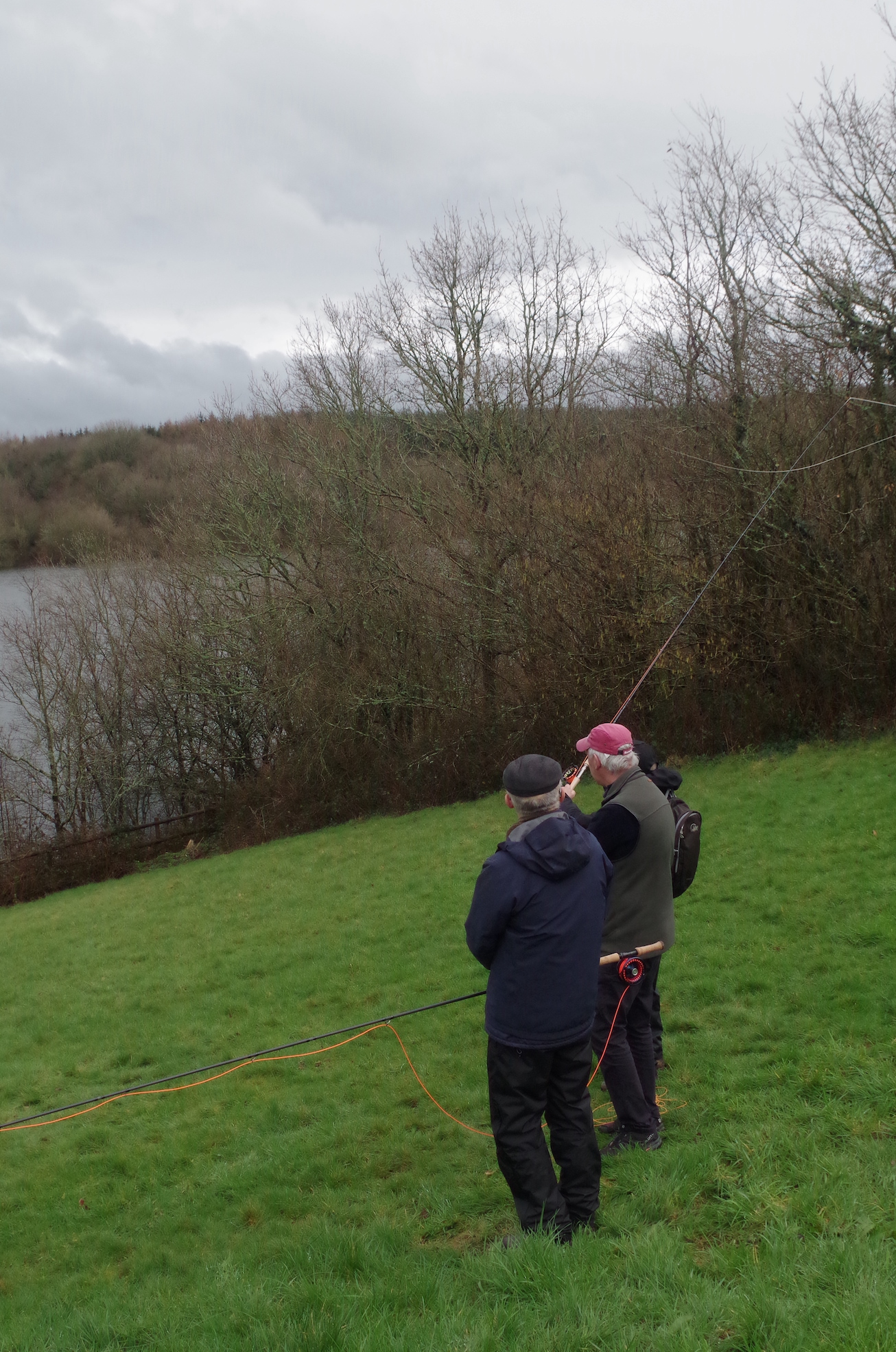
This year’s fly fair brought together a wide dynamic of anglers from the West Country Fly Fishing scene. With a new season ahead, there was undoubtedly a positive and optimistic drive as the leaders of this pastime urged us to get out fishing and support our local fisheries.

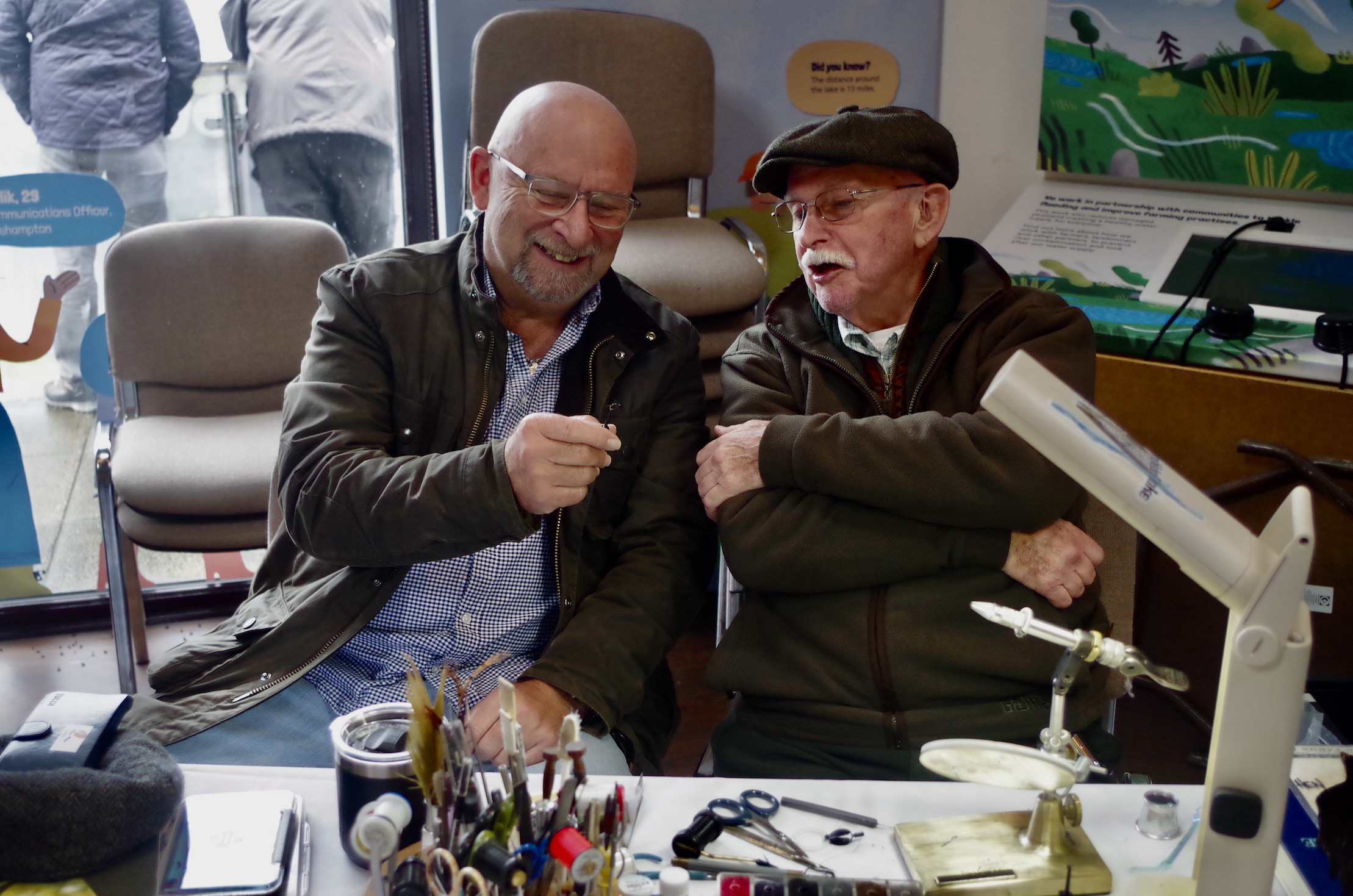
Concern for the environment was evident with fishery associations promoting their waters that are often surprisingly cheap alternatives to the commercial waters.

Companies like Catch and Fish Pass are now offering a new way to buy day permits using the latest mobile phone technology.
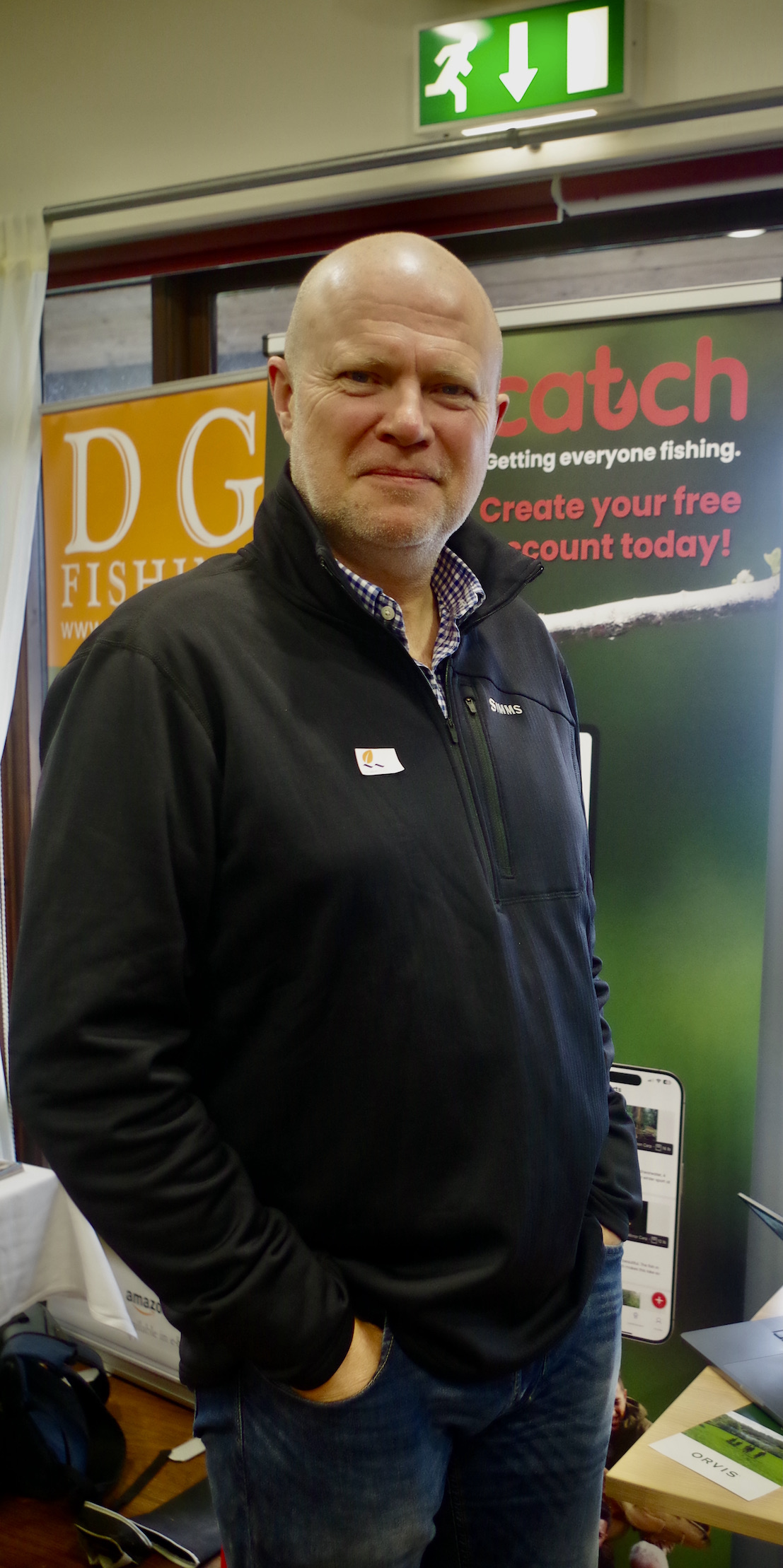
In contrast to the modern world traditional craftsmen like Luke Bannister were at hand to display magical wands of split cane that add sweet perfection to an angler’s day.
I took pleasure in introducing Michelle Werrett whose new book Song of the Streams is enchanting readers to fellow author Mike Weaver whose writing has delighted West Country anglers for many decades. His book In Pursuit of Wild Trout published in 1991 is a classic tome that is timeless in its validity.
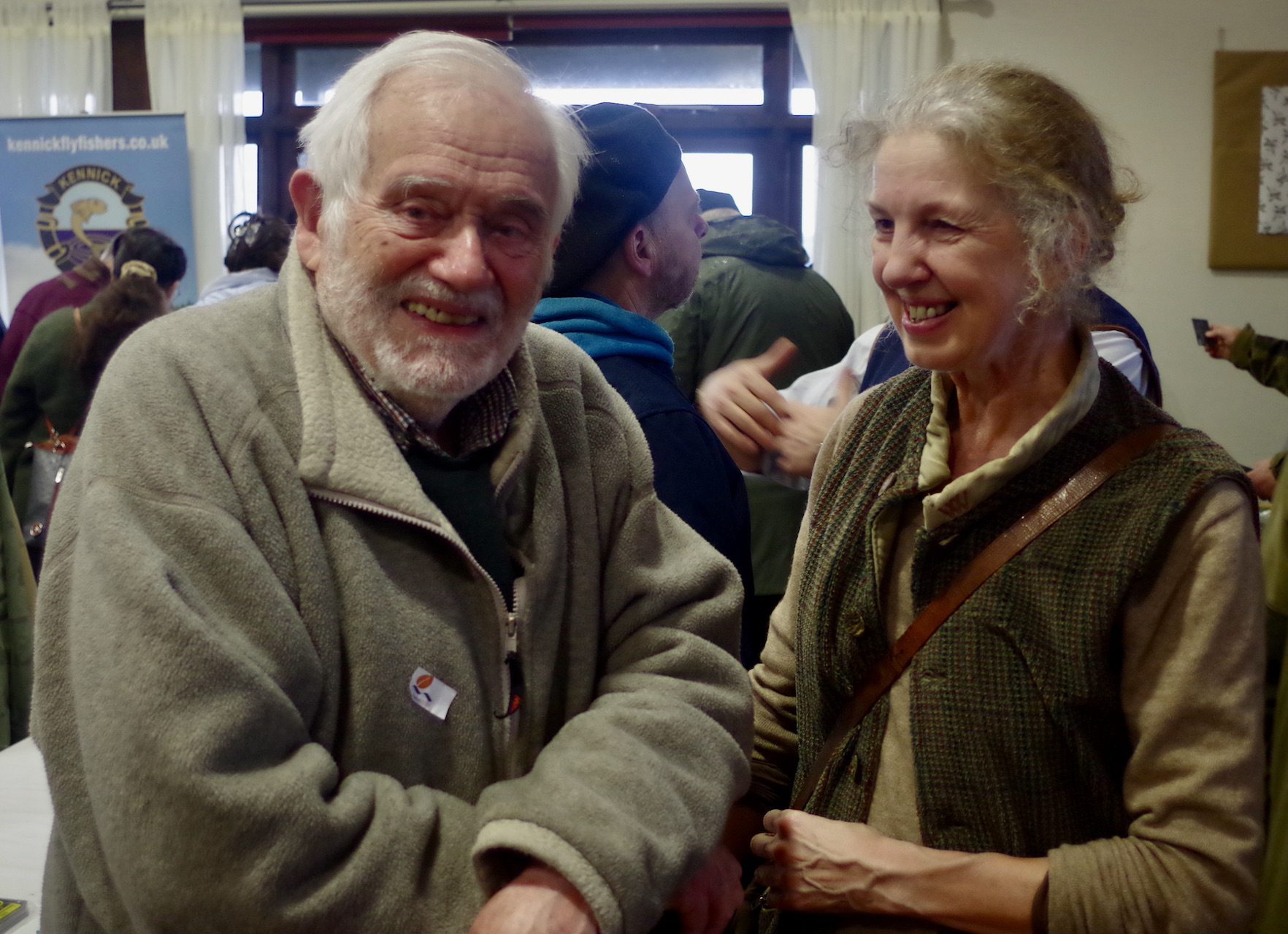
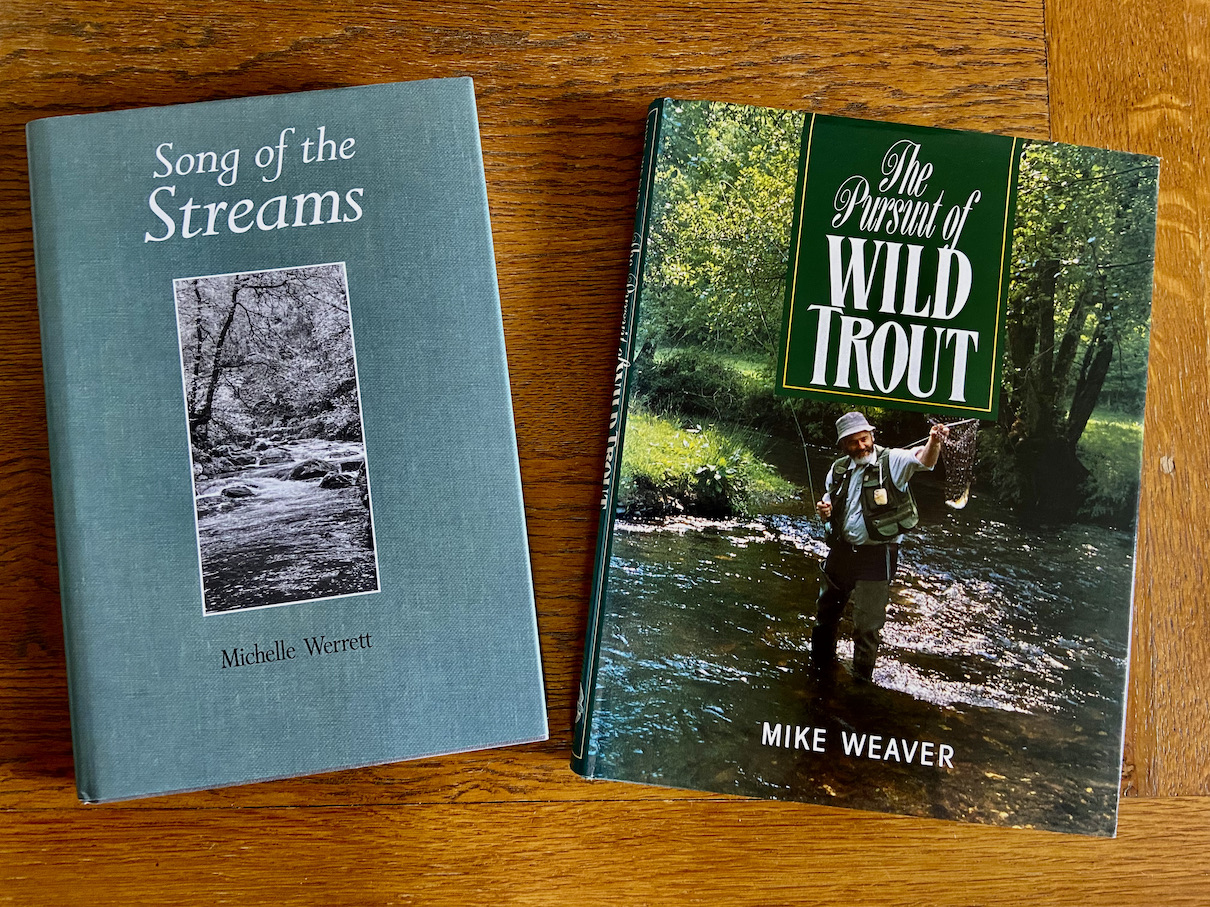
The West Country has a wealth of wild streams that offer exciting fishing for wild brown trout and a sadly diminishing number of salmon and sea trout. Adrian Bryant has been promoting the excellent film Riverwoods across the region and I joined him in presenting a short preview of this film giving my own brief view on the tragic decline of salmon.
Chatting with many at the Fly Fair it was apparent that there is a willingness to adapt and there are signs that new thinking is starting to break down the barriers of tradition. There is a growing desire to fish for varied species across different waters.
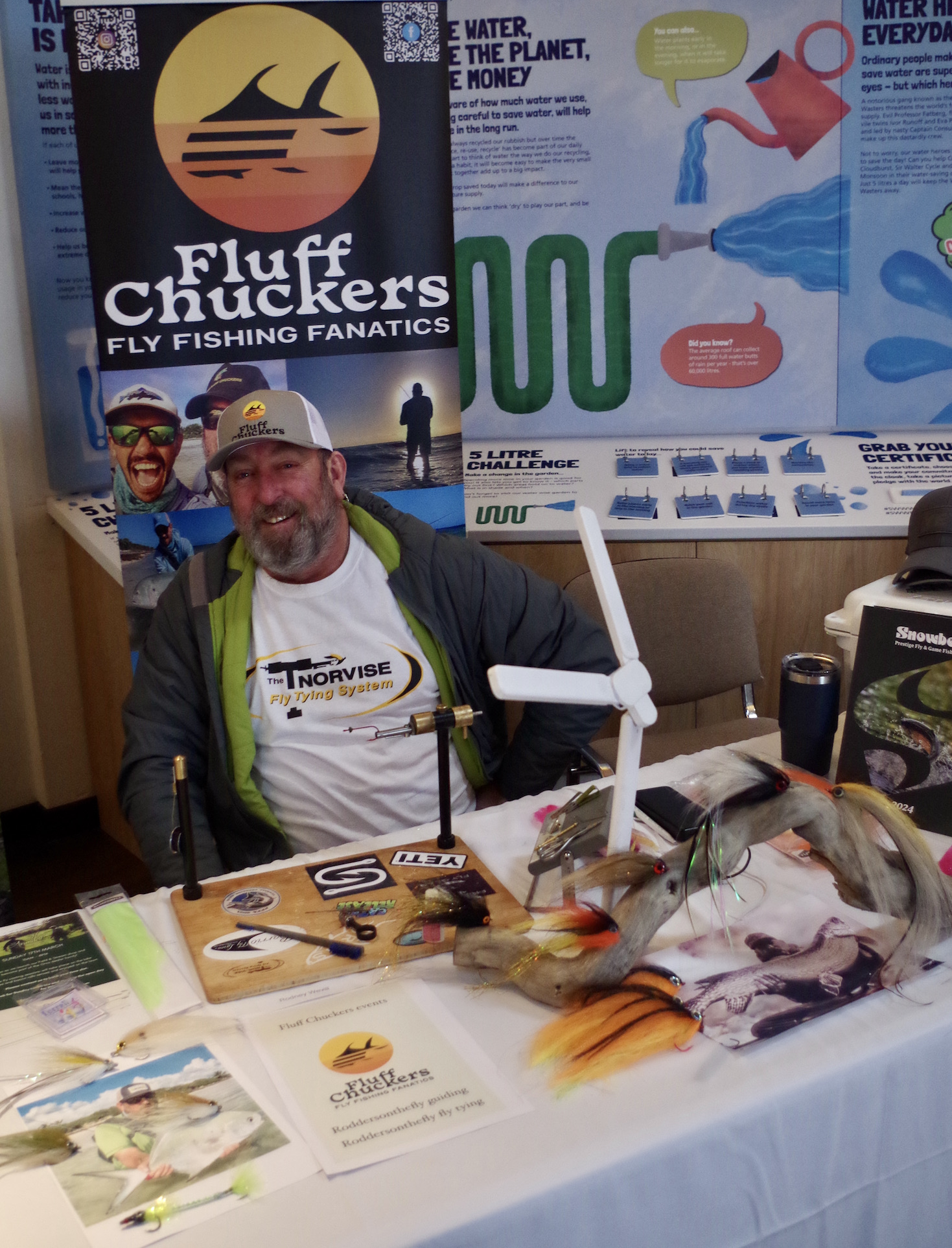
Pike from large stillwater’s and canals are an increasingly reported trend. Perch, rudd and carp are also gaining a following with Dominick Garnett columnist for the Angling Times giving a thought provoking talk on fly fishing for coarse fish. There is also an increasing number of anglers targeting sea fish with bass and mullet offering exciting sport during those hot months of summer when the trout are dwelling deep down in the reservoirs.
There are those who taking fly fishing into cross over territory with LRF with talk of using squirmy flies employed to catch blennies and other species from rock pools using 2 wt. rods more often used to target wild brown trout in moorland streams.
The definition of Fly Fishing on Wikipedia is “ Fly fishing is an angling technique that uses an ultra-lightweight lure called an artificial fly, which typically mimics small invertebrates such as flying and aquatic insects to attract and catch fish.”
This differs somewhat to my own thoughts where I had always believed fly fishing to be a technique that involves projecting the fly to the fish using a line as the weight. The traditional casting styles were entrenched within my mind set. But I now see an unfurling world of unorthodox presentations as anglers dibble and jig their flies or lures.
This is a world far from those days captured within the classic tomes depicting Fly Fishing on the revered chalk streams of England. Surely though there is room for all as our splendid pastime evolves as it always has?
We are living in times far removed from those of Halford whose doctrine of the Upstream Dry Fly stimulated debate within the world of the wealthy and privileged during Victorian Times.
I returned home from this year’s fly fair full of enthusiasm for the coming season with plans made that this year I really must try to make happen.
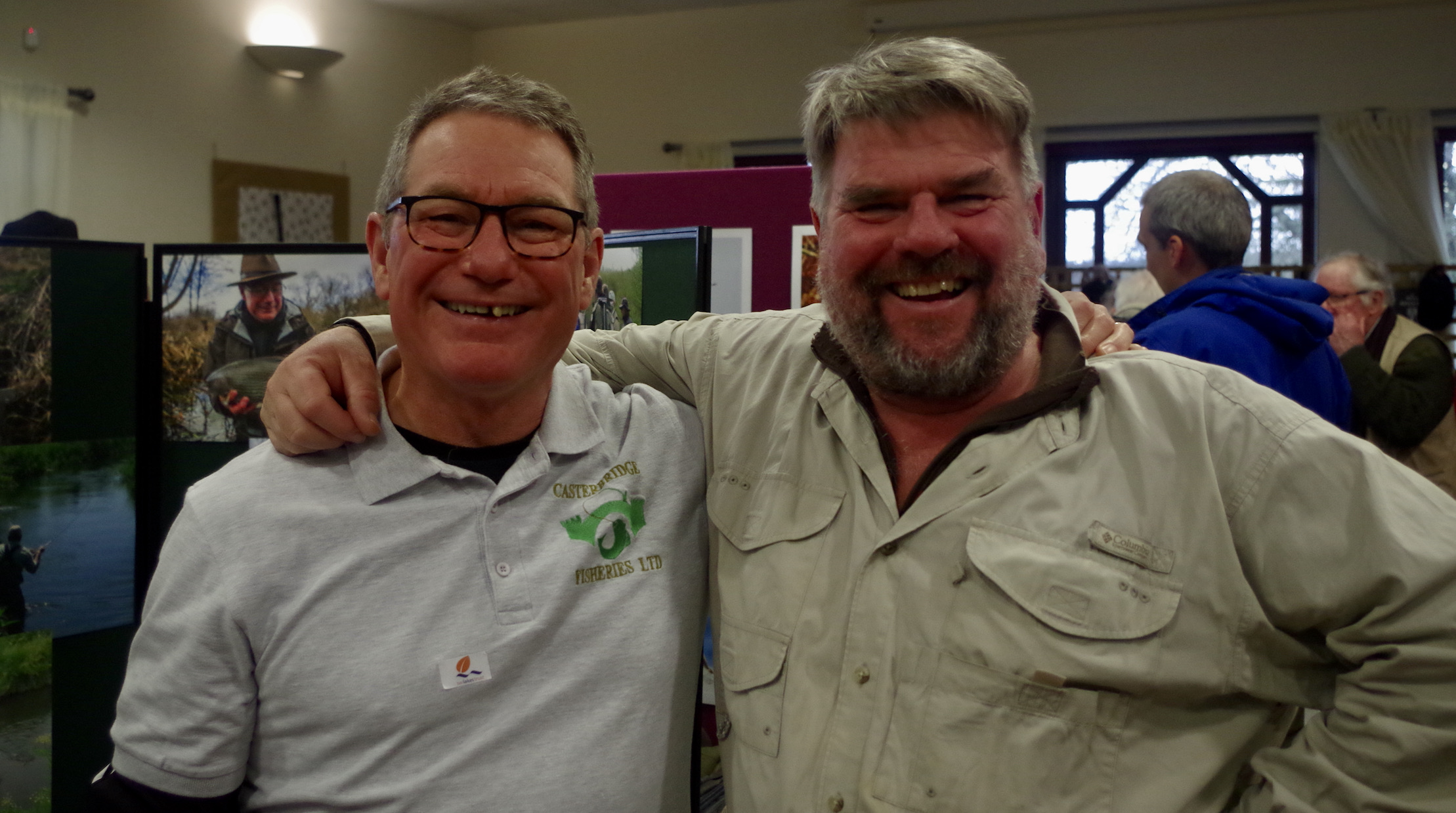
Many thanks to Ashley Bunning and all at South West Lakes Trust for hosting a fabulous fair.
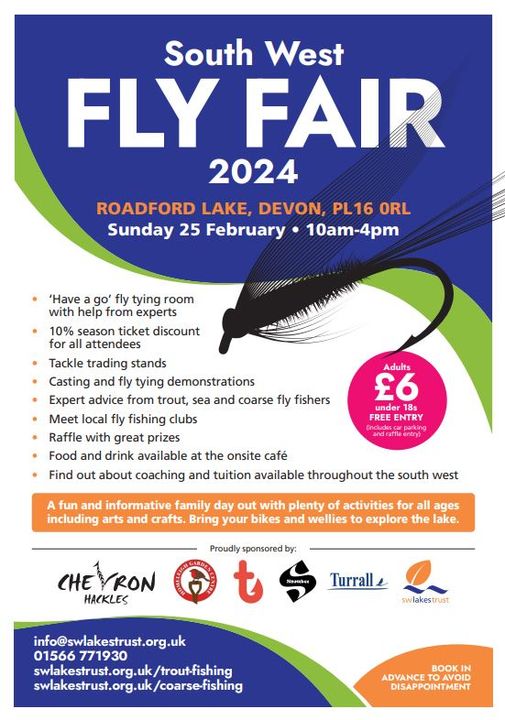
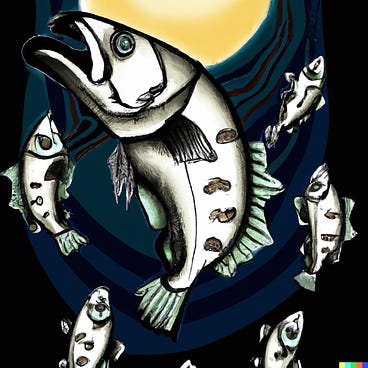
Twilight
The river beckons and eyes falter, straining in the fading monochrome half-light. As they weaken, so our ears fine-tune to the emerging clamour of the night: The chattering river, the owls and the scurrying creatures of the bankside. The night time world is waking.
The dictionary has a word for this: it is the hour when the world turns crepuscular. And is there a better time to go fishing? The hour when we crepuscules emerge blinking into the gathering gloom?
So let’s get down to business: My first and most important task is to reach my pool in time to catch the last of the light. Once there I’ll sit on the bank, read the lie of the water and wait for it to get properly dark. This is, of course, an impossible call because no matter how long I sit and stare, the darkness never quite takes over. My widening eyes adapt just enough to keep me merely half-blind: I see the shadow shapes of trees and anything small silhouetted against the sky. But where land and water merge, all detail is lost.
But hey, who’s in a hurry? I’m enjoying the moment and all the while my senses paint a picture of the pool: the chuntering water, the flitting bats I glimpse but no longer hear, and sometimes, most wonderful of all, an otter or even two. And there – did you hear it – a fish churning close to the far bank. Just a moderate cast downstream. Catchable, but still I wait
Inevitably, my mind starts to wander. Big questions press in: Why do I catch nearly all my Sea Trout on Teal, Blue and Silvers? Why don’t I fall in at night – I’m quite good at it during the day. And what the heck is a Sea Trout?
Ah, there’s the thought. What the heck is a Sea Trout? For a great deal of my life this didn’t much bother me. They’re a vague sub-species of brown trout, right? Rather like the relationship between Steelhead and Rainbow Trout. So trout are trout, salmon are not, and sea trout are somewhere in between. Taxonomy? Pah! Who needs it.
I was wrong. Forget Salmon, they’re something else and irrelevant to this article. But Sea Trout and Brown Trout are the same thing. Identical, right down to their last drop of DNA. One’s bigger and the other is usually smaller, because one went to sea and the other didn’t. Or, rather, it hasn’t yet. One is bright silver when it runs back into the river – but soon reverts to its true brown trout colours.
This is important because it puts the lie to a theory I’ve been nurturing for a decade or two. Namely, that with Salmon numbers in free-fall, Sea Trout could save my fishing.
My theory went like this: Most returning Sea Trout are smaller school fish. They run into their rivers in shoals, while their bigger brothers and sisters make their way in their own good time. And over the decades school fish been getting smaller. I have not a shred of evidence to support this, but it seems to me they’ve halved in size from 1.5lbs to 3/4lb. There are plenty of wise river keepers who will say that the reason for this is that 3/4lb Sea Trout can swim through the inshore gill nets, set for bass and that kill uncounted numbers of Salmon (and big Sea Trout).
So, I reasoned, there would always be sea trout returning to river hitting the redds and ensuring the future of the, um, Sea Trout. Long after the last salmon had played the last post, there would still be sea trout slipping through the nets and heading up-river and towards me.
Ah well. Wrong again.
My theory fails at that moment when part of a river’s Brown Trout population decides it’s going to up sticks and go to sea. It may be because there are too many competing trout in the river. Or not so many trout, but even less food. Why one fish decides to go and another doesn’t we can’t say. Some do, some don’t.
Maybe they just fancy a change of scene. When New Zealand’s rivers were stocked with Loch Leven’s trout all those years ago, there were rivers where the entire population of new fish upped sticks and left for the sea and a new river. They’d had look at their new home, didn’t like it and without so much as a thanks or goodbye, left never to return
However, the stakes on going to sea are high. Migrating smolts face many more dangers than had they stayed in the river. There are more predators, for example. And like salmon, climate change and warmer water is shrinking smolt size, and the smaller a smolt, the less chance it has of surviving the journey. So the decision to head to sea is getting more dangerous.
The reward for the ones that make it is food. They grow faster and bigger, and that pays off when they return to the river to breed. Big fish can dominate the redds.
So for this stage in their lives, the decision to go to sea is about the survival of all brown trout. They’re a species hedging its bets. Some stay, some go. Some will win, some lose. Hindsight is everything.
Unfortunately, that hedged bet is getting more dangerous. A recent Norwegian report surveyed 10,000 miles of Sea Trout rivers and lakes ranging from the Arctic to the south of the country. In only 25% were Sea Trout populations considered healthy. They had disappeared altogether in some rivers, and in 40% populations were in either a poor or very poor condition.
And their biggest threat? It’s sea lice, the major by-product of salmon farming. 83% of all the water surveyed was impacted by farmed sea lice. Amongst salmonids, Sea Trout are hardest hit by lice because they stay in coastal waters where open-net cage salmon farms are found.
The bad news doesn’t end with the fish farms. Globally, the fishing effort at sea has industrialised. At the same time, rising sea temperatures collapse ocean food chains and stop some fish breeding (fry are a major source of Sea Trout food). The laval soup at the base of the ocean food chain thins out, and the bait fish that depend on it get smaller and carry less body fat – in part because warmer water raises their metabolic rate so they have to eat more just to keep going. That metabolic trap works its way up the food chain – bigger fish also need to eat more just to maintain body weight, but there’s less food. This is the world Sea Trout migrate to feed in.
Unfortunately, staying in the river is also difficult. So much so that if I allow myself to get properly gloomy about this I have to say the trout rivers in my part of the world are becoming hostile environments for fish,
Trout redds are usually further into the headwaters than a Salmon’s. These smaller streams are warming faster as our climate changes, and they’re more vulnerable to farm pollution. The brutal truth is that the survival rate for smolts shrinks by as much as 70% if they start their return journey short of peak fitness and weight.
There’s more. The increasingly heavy rainstorms driven by our warming atmosphere wash redds downstream, leaving behind beds of small stones where once there was gravel. And, in my part of the world, rivers are a cheap way for water companies to move human sewage to the sea and boost dividends for shareholders. Meanwhile, dairy farmers have massively increased stocking density so slurry mixes with chicken and human shit to turn the water phosphate green and coat river beds with algal slime. Insects and fry don’t stand a chance. Clean rivers are increasingly hard to find.
Despite all this, I’m still fishing, still crepuscular and always thrilled to be part of the gloaming. Is there anything to beat the excitement of the wallop administered by turbocharged 2lb Sea Trout take at midnight?
And the weirdest thing about night fishing? It’s that I so rarely catch the opposite bank. I like to think this because I cast really well. I’m so good I could hit a dimpled rise with my eyes closed. Hmmm. A more likely explanation is that I always cast short. But I’m not changing anything now.
Finally, did I tell you about the time 2 otters thrashed and trashed my pool as I watched darkness close in – and how, as soon as they left, I caught an 8lb Sea Trout with my first cast and 6lber with my third?
There’s nothing on earth to beat crepuscular fishing. Although maybe I should experiment with some new fly patterns. It’s possible that Teal, Blue and Silver may not be the only fly that catches Sea Trout.
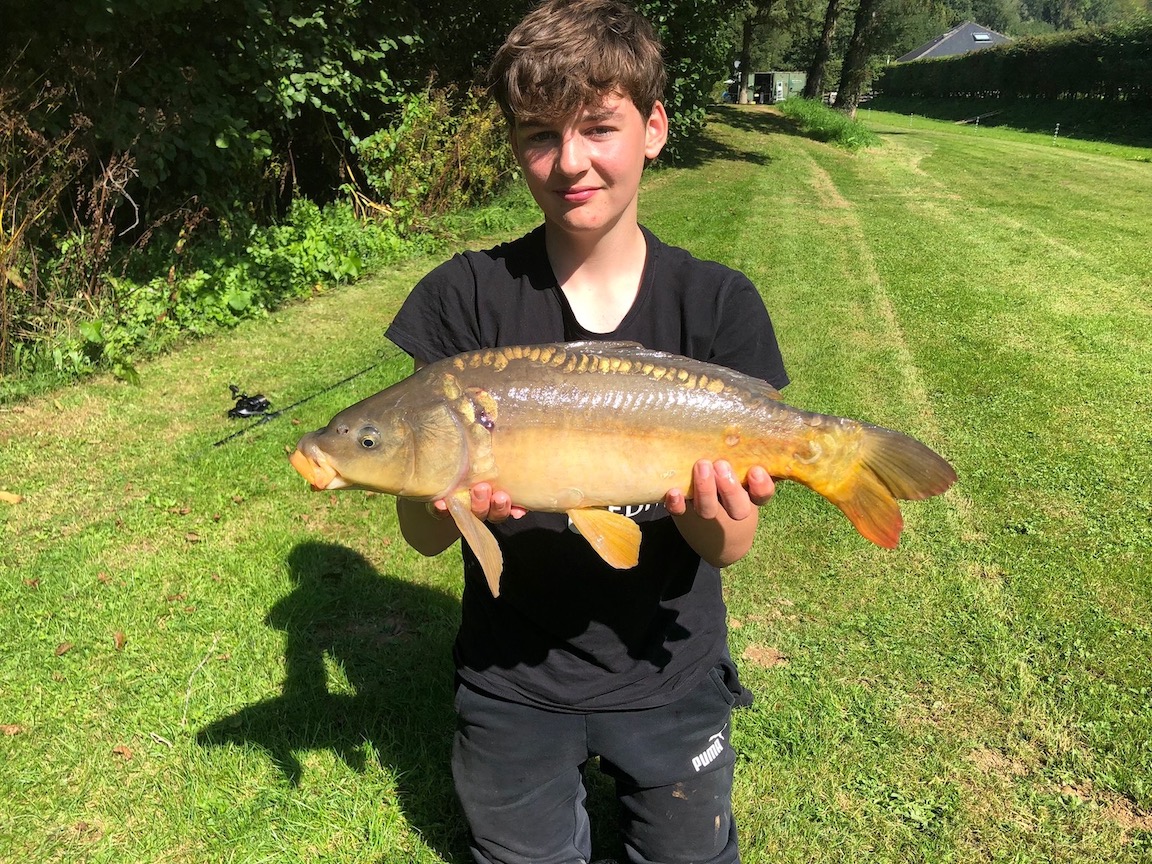
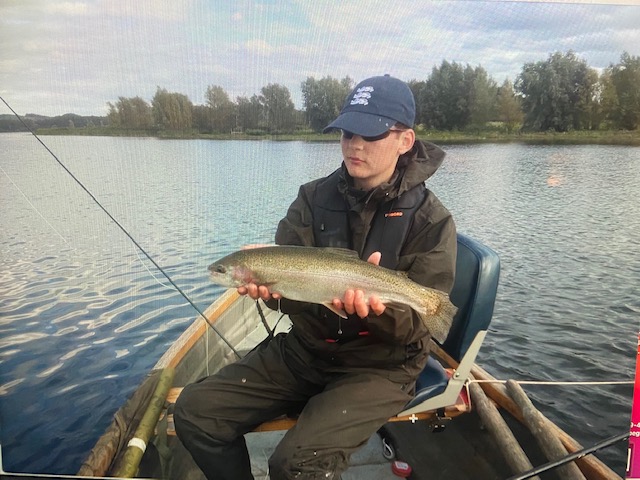
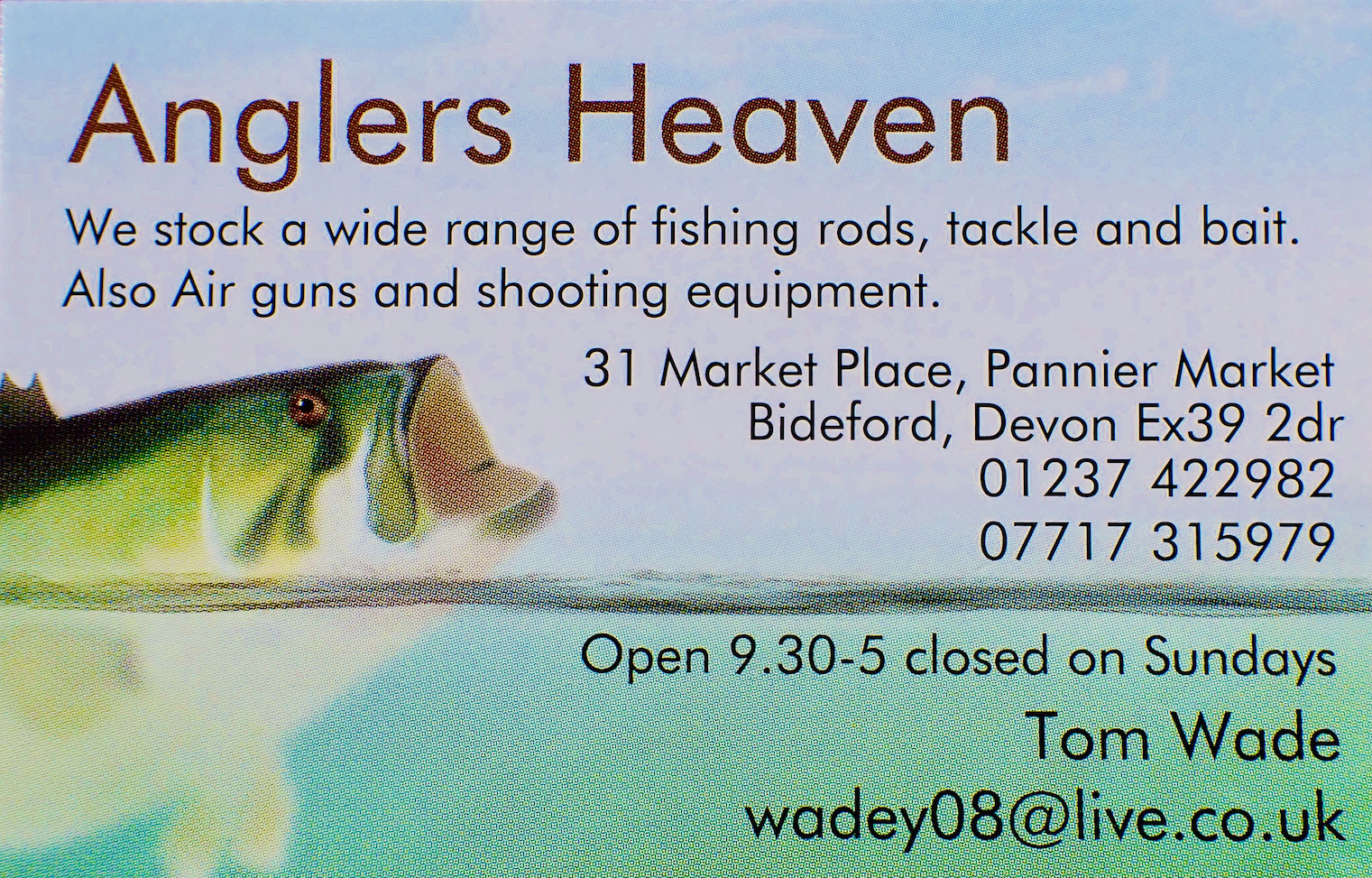
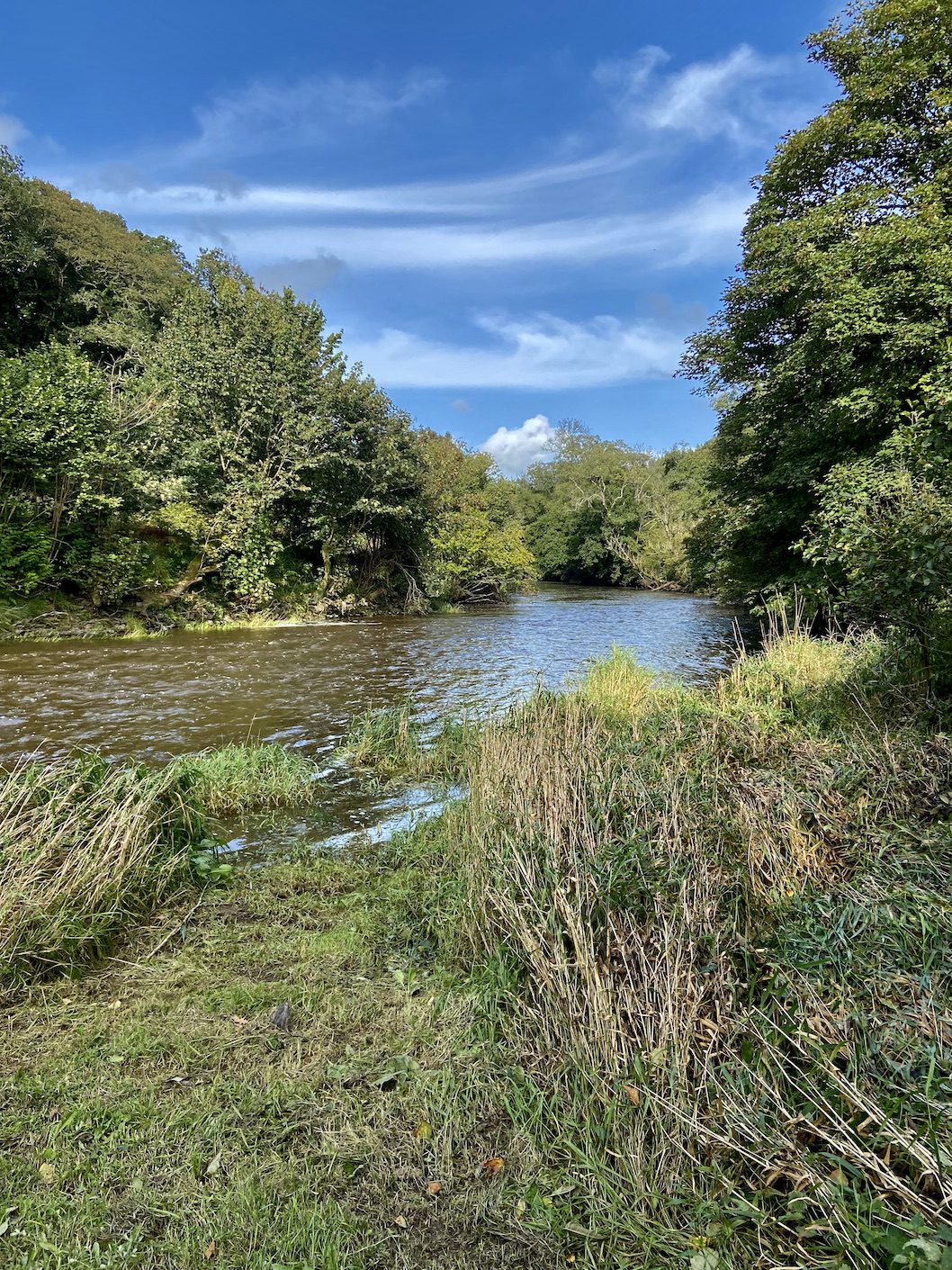
Game Section Competition Dates 2024
MARCH
31st Mar. Clatworthy Somerset.
APRIL
28th Apr. Wimbleball Somerset.
MAY
26TH May Roadford Devon
JUNE.
30th Jun. To Be Confirmed.
JULY.
28th Jul. Clatworthy Somerset
AUGUST.
25th Aug. Colliford Cornwall.
All Comps can start when venues open. weigh in @ 4pm
If you require any further information phone Terry Dymond 07585588595.